#hand in hand with building character and characterization from theme. i love you so
Explore tagged Tumblr posts
Note
I know you like to analyze thematically in TDP a lot and you write top down the same way, so I’m curious, what are some of the themes/motifs in your upcoming novels? and do any of them coincide with TDP?
(GASP you get a gold star oh my god thank you!! and i will try to not make this too Long but i'm very excited!!)
Basic premise for ppl who have never heard of my novels before:
Latest generation of a reincarnated group of chosen ones have to grow up in a world of increasing violence and political instability that they're supposed to fix while also facing their own choices and demons. The main character, Ally, starts off as an 'unchosen one' — she lost her powers as a young child and has been trying to get them back, which kinda makes her resent her chosen one friends just as much as she loves them. The other two co-leads are her twin sister, a former child soldier with death powers she doesn't want, and her friend / one sided rival, a draconic-powered prodigy looking for redemption and to escape her past.
The funny thing is that when I was writing out my series (2014-2017 has all the pieces we currently have, though things have ofc been finessed since then) only ATLA existed as an inspiration point, which was, "How do you always know the Avatar is going to be a good person (and what if you didn't? What if they weren't)?" + "what if there was more than one running around?"
The rest was all from my head. There's a mystical magical heart broken into pieces. A continent divided in two with a long history of war. Characters anchored to the idea of Autonomy who then go through a loss of powers arc (hi Callum s2) and then brainwashing/possession arc (hi arc 2 Callum) that was probably by far the funniest coincidence. Circles and cycles and children and choices. The fact that these all just also found their way into TDP shows just how much it feels like the show was Made For Me in the best way creatively, and one of the reasons I think I've found TDP so personally rewarding to analyze—happy coincidences all around.
There's other coming-of-age themes of course that are shared between the two—grief, identity, friendship—but being prose I get to lean more into religious and political worldbuilding in much more detail.
I think my novel(s) are also more grey and angsty (especially later on) than TDP was at the start, too. A good chunk of my protagonists don't have any moral reservations about assassinations or killing/torturing people push come to shove while also still wanting and trying to be Good People, but that just makes the ethical dilemmas more interesting to explore. That said, everything is ultimately more Hopepunk, I just prefer to never pull punches on the way there
Motifs I like to use:
a tarot inspired in-universe version of chess for foreshadowing purposes
stage motif (who are you when you're performing for everyone around you / constantly fronting?)
birds / ravens
wolves
knives
eyes / the ouroboros (snake eating its own tail)
Themes: gods vs monsters (vs humanity), complex family and friend dynamics, living vs survival, grief and cycles, loss of sense of self, idolization and scapegoating as two sides of dehumanization, etc.
I also wanted to have unique power sets (Moon is one of my favourites with leaning into shadow magic and being able to make things temporarily out of moonlight, or Life not just being all fuzzy plants and animals and showing more of the well, brutality of being alive).
People have said my main protag is basically if Claudia and Rayla were the same person and yeah that's a fair assessment, Unfortunately for her.
I feel like I blabbed enough here but if you want more info on writing things from a top-down approach / what it's like to build from theme first I'd love to talk about it more in relation to TDP (and also my books, mayhaps!)
#thanks for asking#my books#wishonacomet#me getting to talk about infrans!!!#also like. building plot and book questions from theme#hand in hand with building character and characterization from theme. i love you so#it's basically like if pjo and soc met#or atla + tdp and just. more swearing
12 notes
·
View notes
Note
lowkey it’s a relief to know someone else who didn’t enjoy sunrise on the reaping because i really (sadly) disliked it but everytime i check the sotr tag it’s nothing but praise. it’s not entirely unwarranted because the general ideas and themes of this book ARE good they’re just… not done with the finesse and skill i’ve come to expect from suzanne collins.
but if you want to, i’d love to hear more of your thoughts on the book and its problems, especially re: haymitch’s characterization and the rebel subplot.
I think the crux of the issue of SOTR for me is that while it is a very interesting story with powerful concepts and messaging and themes, it doesn't quite feel like it was supposed to be Haymitch's story.
It feels a little too at odds at times from what we learn of Haymitch when Katniss and Peeta watch his games in Catching Fire. And before anyone tells me "that's the point!" or "you're falling for Capitol propaganda! We all fell for Capitol propaganda!!" the issue here is that no, I don't think we did, because when SC wrote about Haymitch's games in Catching Fire, I doubt she was doing it in mind of a Haymitch prequel more than a decade down the line that would recontextualize the entire story. I think what she wrote in Catching Fire in 2009 about Haymitch's games is exactly what it was supposed to be.
Then I think present day SC sat down to write sotr and decided she wanted to write a story about the long-standing power of propaganda. That rebellions are long burning and slow building and people will try and fail and try again. And so she adapted Haymitch's story to fit those themes.
And that's fine! It's fine that it's a bit of a retcon. A retcon doesn't have to be inherently bad and I did find SOTR entertaining overall but like I said, I don't think it fits so cleanly with the rest of the trilogy as others seem to think it does.
For instance, taking these scenes from Catching Fire:

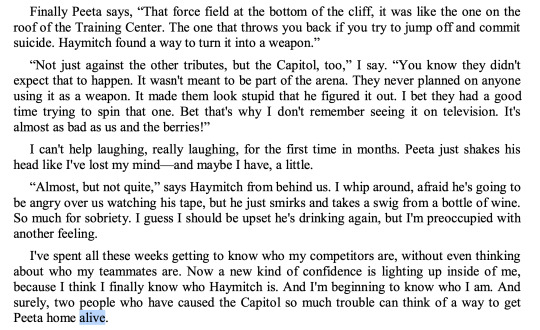
Given what know now from SOTR... well Katniss and Peeta's understandings and takeaways aren't quite right anymore, are they? "But what she doesn't know, and what he does, is that the ax will return." The implication here being that Haymitch planned that moment. But actually Katniss, that's wrong! Haymitch wasn't intentionally leading Silka to the cliff to use the forcefield against her, that was all a complete accident. And it's even worse because Katniss follows it up with: "I think I finally know who Haymitch is. And I'm beginning to know who I am." because now this is a scene where she's actually misreading Haymitch to a degree. Sure, her final conclusion is still ultimately correct: She and Haymitch are both people who have caused the Capitol trouble. And she's right in more ways now than she can know but she's also wrong about Haymitch in a significant way as well. (And it sucks because I've seen so many takes now joking about how Katniss is just sooooo bad at reading people but guys I think she was spot on here until Haymitch's story was altered lmao)
And then, just in a general sense, I think the pacing of SOTR is odd at times. I also think it occasionally suffers from a telling instead of showing, being a bit more heavy-handed in its messaging where the original trilogy wasn't. (Like when Haymitch abruptly called Maysilee his sister, just to make sure that we the readers understood their dynamic).
I also struggled to get into Haymitch's and Lenore Dove's romance because despite him waxing poetic about her every page, we only had a single chapter to establish their relationship and her character before they spend the rest of the book apart until the very end. And its a struggle for me because her presence takes up so much of the story and his thoughts, to a degree that I almost felt I wasn't reading about Haymitch anymore at times. On the flip side, I felt like his brother and mother didn't take up nearly enough of his headspace. Like Sid gets pretty much a single line in the epilogue in a sea of Lenore Dove paragraphs.
As for Haymitch's characterization... this is where we get far more into a personal preference territory, but I won't lie, I was and still am far more partial to a "resourceful Haymitch exploring the arena out of his own volition and outsmarting the gamemakers through his own ingenuity" instead of a "resourceful Haymitch acting out a rebel plan from others". I also am more interested in a Haymitch that lead Silka to the cliff to goad her into essentially killing herself than a Haymitch that ended up there seemingly just to escape her or buy time. And sure Haymitch was still intelligent in SOTR, but too often it felt like he was no longer the driving force in his own story. (which very well might have been the point? but if it was, then the execution of it didn't do much for me).
As for the rebel subplot: conceptually I thought it was interesting... but again, I thought the execution of it left a lot to be desired as it completely lost me the moment Haymitch wasn't insta-killed after blowing the water system. And I know we're given in-universe reasons for why he wasn't killed, but I simply can't buy into it. There were still plenty of tributes left, so it's not like the game makers and Snow had to keep him around. I don't think it would have mattered how popular Haymitch was at that point to the viewers. Haymitch also hadn't done anything yet that couldn't have been edited out so it's not like he had to be kept around by Snow and made into an example for other victors. And I think Haymitch had "suffered" enough in the games at that point for Snow to take him out with mutts. (ALSO - I couldn't help but feel that this rebel plot might have been better suited to an Ampert-centered story? Since Ampert seems to be driving so much of the crucial, behind the scenes work that is.)
But this is grossly long so to wrap this up: In my ideal world, this prequel would have gone one of two ways.
(1) A prequel with the themes and messaging and storylines of SOTR but centered on a different character (Ampert? A career, even? This could be an entirely different year of games with no Haymitch)
(2) A Haymitch prequel, but his games are way more in-line with what we were presented with in Catching Fire (still with a degree of propaganda), no beetee-rebel subplot, and we would've spent more time before the games in district 12, as well as after the games tracking his downward spiral.
#sorry this is horrifically long#but honest to god getting this message from you was a relief as well lmaoooo#again to be clear I dont think SOTR is horrible or anything like that I just didn't like what the story ended up being#on the flip side I also dont think its the BEST BOOK EVER and I think its the weakest entry in the hunger games line up#it's truly a mixed bag to me#anti sotr#sotr#the hunger games
173 notes
·
View notes
Text
Dragon Age: The Veilguard: Strangled by Gentle Hands
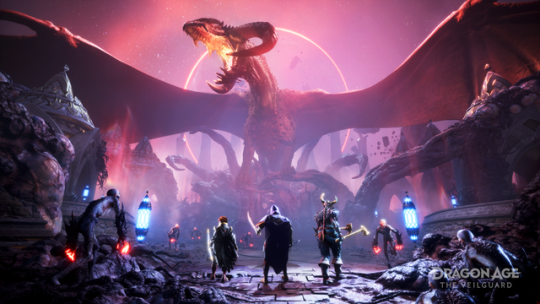
*The following contains spoilers*
“You would risk everything you have in the hope that the future is better? What if it isn’t? What if you wake up to find the future you shaped is worse than what was?”
– Solas, Dragon Age: Inquisition (2014)
I. Whatever It Takes
My premium tickets for a local film festival crumpled and dissolved in my pants pocket, unredeemed as they swirled in the washing machine. Throughout that October weekend in 2015, I neglected my celebratory privileges, my social visits to friends, and even my brutal honors literary theory class. All because a golden opportunity stretched before me: a job opening for a writing position at the once-legendary BioWare, with an impending deadline.
The application process wasn’t like anything I’d seen before. Rather than copy+paste a cover letter and quickly swap out a couple of nouns here and there, this opening required me to demonstrate my proficiency in both words and characters – namely, BioWare’s characters. Fanfiction wasn’t normally in my wheelhouse – at the time, I had taken mainly to spinning love sonnets (with a miserable success rate). But I wouldn’t balk at this chance to work on one of my dream franchises – especially since the job prospects for fresh English BAs weren’t exactly promising. So, I got to work crafting a branching narrative based on the company’s most recent title: Dragon Age: Inquisition. Barely two months prior, I saw the conclusion of that cast’s story when the Inquisitor stabbed a knife into a map and swore to hunt her former ally, Solas, to the ends of the earth. Now it was my turn to puppeteer them, to replicate the distinct voice of each party member and account for how they’d react to the scenario I crafted. And if it went well, then maybe I’d be at the tip of the spear on that hunt for Solas. Finishing the writing sprint left me exhausted, but also proud of my work.
The folks at BioWare obviously felt differently, because I received a rejection letter less than a week later. Maybe they found my story trite and my characterization inaccurate, or maybe they just didn’t want to hire a student with no professional experience to his name. Regardless, I was devastated. It wouldn’t be until years later that I learned that, had my application been accepted, I likely would’ve been drafted into working on the studio’s ill-fated looter shooter, Anthem (2019), noteworthy for its crunch and mismanagement. My serendipitous rejection revealed that sometimes the future you strive to build was never meant to match your dreams. What seemed like an opportunity to strike oil actually turned out to be a catastrophic spill.
Still, my passion for the Dragon Age series (as well as Mass Effect) persisted in the face of BioWare’s apparent decline. I maintain that Inquisition is actually one of the studio’s best games, and my favorite in the series, to the point where I even dressed up as Cole for a convention one time. The game came to me at a very sensitive time in my life, and its themes of faith vs falsehood, the co-opting of movements in history, and the instability of power all spoke to me. But I will elaborate more on that at a later date. My point is, I held on to that hope that, in spite of everything, BioWare could eventually deliver a satisfactory resolution to the cliffhanger from their last title. Or perhaps it was less hope and more of a sunk cost fallacy, as an entire decade passed with nary a peep from Dragon Age.
As years wore on, news gradually surfaced about the troubled development of the fourth game. Beginning under the codename “Joplin” in 2015 with much of the same creative staff as its predecessors, this promising version of the game would be scrapped two years later for not being in line with Electronic Arts’s business model (i.e. not being a live-service scam). Thus, it was restarted as “Morrison”. The project cantered along in this borderline unrecognizable state for a few years until they decided to reorient it back into a single-player RPG, piling even more years of development time onto its shaky Jenga tower of production. Indeed, critical pieces were constantly being pulled out from the foundations during this ten year development cycle. Series regulars like producer Mark Darrah and director Mike Laidlaw made their departures, and the project would go on to have several more directors and producers come and go: Matthew Goldman, Christian Dailey, and Mac Walters, to name a few key figures. They eventually landed on John Epler as creative director, Corinne Busche as game director, and Benoit Houle as director of product development. Then came the massive layoffs of dozens of employees, including series-long writer Mary Kirby, whose work still made it into the final version of DA4. Finally, the game received a rebranding just four months before release, going from Dreadwolf (which it had been known as since 2022) to The Veilguard (2024) – a strange title with an even stranger article.
Needless to say, these production snags did not inspire confidence, especially considering BioWare’s been low on goodwill between a string of flops like Anthem and Mass Effect: Andromeda (2017) and, before that, controversial releases like Dragon Age II (2011) and Mass Effect 3 (2012). The tumult impacted The Veilguard’s shape, which scarcely resembles an RPG anymore, let alone a Dragon Age game. The party size is reduced from four to three, companions can no longer be directly controlled, the game has shifted to a focus on action over tactics a la God of War (2018), the number of available abilities has shrunk, and there’s been a noticeable aesthetic shift towards a more cartoonish style. While I was open to the idea of changing up the combat (the series was never incredible on that front), I can’t get over the sensation that these weren’t changes conceived out of genuine inspiration, but rather vestigial traces from the live-service multiplayer iteration. The digital fossil record implies a lot. Aspects like the tier-based gear system, the instanced and segmented missions, the vapid party approval system, the deficit of World State import options, and the fact that rarely does more than the single mandatory companion have anything unique to say on a quest – it all points to an initial design with a very different structure from your typical single-player RPG. The Veilguard resembles a Sonic Drive-In with a mysterious interior dining area – you can tell it was originally conceived as something else.1
That said, the product itself is functional. It contains fewer bugs than any previous game in the franchise, and maybe BioWare’s entire catalog for that matter. I wouldn’t say the combat soars, but it does glide. There’s a momentum and responsiveness to the battle system that makes it satisfying to pull off combos and takedowns against enemies, especially if you’re juggling multiple foes at once. Monotony sets in after about thirty or forty hours, largely due to the fact that you’re restricted to a single class’s moveset on account of the uncontrollable companions. Still, this design choice can encourage replay value, as it does in Mass Effect, and free respec options and generous skill point allocations offset the tedium somewhat.
While the character and creature designs elicit controversy – both for the exaggerated art direction and, in the case of demons and darkspawn, total redesign – the environmental art is nothing short of breathtaking. I worried that this title would look dated because of how long it had been in development and the age of the technology it was built upon. Those fears were swiftly banished when I saw the cityscapes of Minrathous, the cyclopean architecture of the Nevarran Grand Necropolis, or the overgrown ruins of Arlathan. But like everything in The Veilguard, it’s a double-edged sword. The neon-illuminated streets of Docktown, the floating citadel of the Archon’s Palace, and the whirring mechanisms of the elven ruins evoke a more fantastically futuristic setting that feels at odds with all three previous titles (even though all three exhibited a stylistic shift to some extent). It aggravates the feeling of discordance between this rendition of Thedas and the one returning players know.
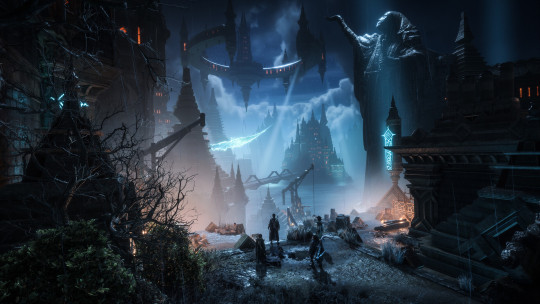
All of these elements make The Veilguard a fine fantasy action-adventure game – even a good one, I’d say. But as both the culmination of fifteen years of storytelling and as a narrative-based roleplaying game – the two most important facets of its identity – it consistently falls short. Dragon Age began as a series with outdated visuals and often obtuse gameplay, but was borne aloft by its worldbuilding, characterization, and dialogue. Now, that paradigm is completely inverted. The more you compare it to the older entries, the more alien it appears. After all these years of anticipation, how did it end up this way? Was this the only path forward?
Throughout The Veilguard’s final act, characters utter the phrase “Whatever it takes,” multiple times. Some might say too many. I feel like this mantra applied to the development cycle. As more struggles mounted, the team made compromise after compromise to allow the game to exist at all, to give the overarching story some conclusion in the face of pressure from corporate shareholders, AAA market expectations, and impatient fans. Whatever it takes to get this product out the door and into people’s homes.
This resulted in a game that was frankensteined together, assembled out of spare parts and broken dreams. It doesn’t live up to either the comedic heights or dramatic gravity of Inquisition’s “Trespasser” DLC from 2015, despite boasting the same lead writer in Trick Weekes. Amid the disappointment, we’re left with an unfortunate ultimatum: It’s either this or nothing.
I don’t mean that as a way to shield The Veilguard from criticism, or to dismiss legitimate complaints as ungrateful gripes. Rather, I’m weighing the value of a disappointing reality vs an idealized fantasy. The “nothing”, in this sense, was the dream I had for the past decade of what a perfect Dragon Age 4 looked like. With the game finally released, every longtime fan has lost their individualized, imaginary perfection in the face of an authentic, imperfect text. Was the destruction of those fantasies a worthy trade? It doesn’t help that the official artbook showcases a separate reality that could’ve been, with a significant portion dedicated to the original concepts for Joplin that are, personally, a lot closer to my ideal vision. I think it would’ve done wonders to ground the game as more Dragon Age-y had they stuck with bringing back legacy characters, such as Cole, Calpernia, Imshael, and the qunari-formerly-known as Sten.
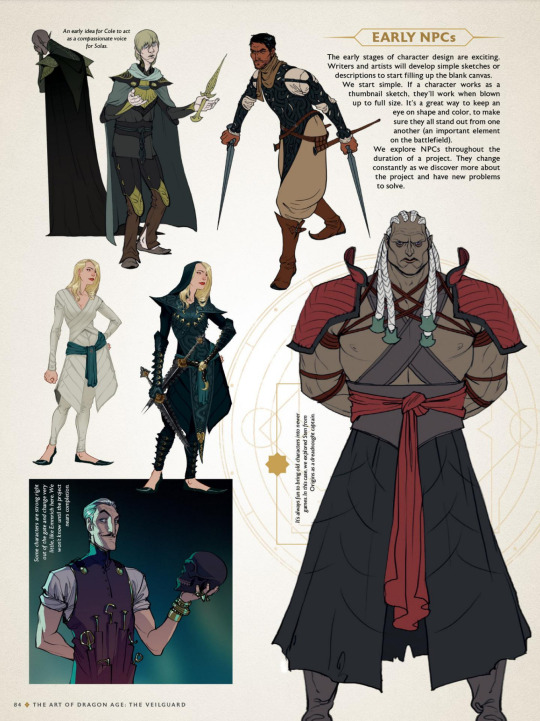
I don’t necessarily hate The Veilguard (I might actually prefer it to Dragon Age II), but I can’t help but notice a pattern in its many problems – a pattern that stems from a lack of faith in the audience and a smothering commitment to safety over boldness. As I examine its narrative and roleplaying nuances, I wish to avoid comparing it to groundbreaking RPGs such as Baldur’s Gate 3 (2023) or even Dragon Age: Origins (2009), as the series has long been diverging from that type of old-school CRPG. Rather, except when absolutely necessary, I will only qualitatively compare it to Inquisition, its closest relative.
And nowhere does it come up shorter to Inquisition than in the agency (or lack thereof) bestowed to the player to influence their character and World State.
II. Damnatio Memoriae
No, that’s not the name of an Antivan Crow (though I wouldn’t blame you for thinking so, since we have a character named “Lucanis Dellamorte”). It’s a Latin phrase meaning “condemnation of memory”, applied to a reviled person by destroying records of their existence and defacing objects of their legacy. In this case, it refers to the player. When it comes to their influence over the world and their in-game avatar, The Veilguard deigns to limit or outright eliminate it.
Save transfers that allow for the transmission of World States (the carrying over of choices from the previous games) have been a staple of the Dragon Age and Mass Effect franchises. Even when their consequences are slight, the psychological effect that this personalization has on players is profound, and one of many reasons why fans grow so attached to the characters and world. At its core, it’s an illusion, but one that’s of similar importance to the illusion that an arbitrary collection of 1s and 0s can create an entire digital world. Player co-authorship guarantees a level of emotional investment that eclipses pre-built backgrounds.
However, The Veilguard limits the scope to just three choices, a dramatic decrease from the former standard. All import options come from Inquisition, with two just from the “Trespasser” expansion. One variable potentially impacts the ending, while the other two, in most cases, add one or two lines of dialogue and a single codex entry. Inquisition, by contrast, imported a bevy of choices from both previous games. Some of them had major consequences to quests such as “Here Lies the Abyss” and “The Final Piece”, both of which incorporated data from two games prior. The Veilguard is decidedly less ambitious. Conspicuously absent options include: whether Morrigan has a child or not, the fate of Hawke, the status of the Hero of Fereldan, the current monarchs of Fereldan and Orlais, the current Divine of the southern Chantry, and the individual outcomes of more than two dozen beloved party members across the series. Consequently, the fourth installment awkwardly writes around these subjects – Varric avoids mentioning his best friend, Hawke, as does Isabela ignore her potential lover. Fereldan, Orlais, and the Chantry are headed by Nobody in Particular. Morrigan, a prominent figure in the latest game, makes no mention of her potential son or even her former traveling companions. And the absence of many previous heroes, even ones with personal stakes in the story, feels palpably unnatural. I suspect this flattening of World States into a uniform mold served, in addition to cutting costs, to create parity between multiple cooperative players during the initial live-service version of Morrison. Again, the compromises of the troubled production become apparent, except this time, they’re taking a bite out of the core narrative.
Moreover, the game’s unwillingness to acknowledge quantum character states means that it’s obliged to omit several important cast members. At this point, I would’ve rather had them establish an official canon for the series rather than leaving everything as nebulous and undefined as possible. That way at least the world would’ve felt more alive, and we could’ve gotten more action out of relevant figures like Cassandra, Alistair, Fenris, Merrill, Cole, and Iron Bull. Not to mention that The Veilguard’s half-measure of respectful non-intereference in past World States ultimately fails. Certain conversations unintentionally canonize specific events, including references to Thom Rainier and Sera, both of whom could go unrecruited in Inquisition, as well as Morrigan’s transformation into a dragon in the battle with Corypheus in that game’s finale. But whatever personal history the player had with them doesn’t matter. The entire Dragon Age setting now drifts in a sea of ambiguity, its history obfuscated. It feels as gray and purgatorial as Solas’s prison for the gods.
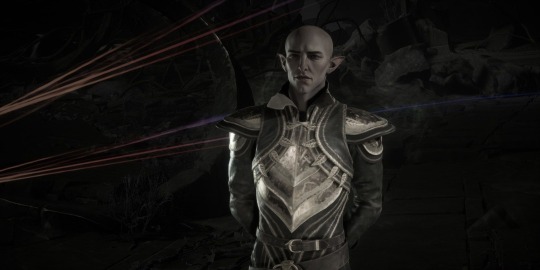
Beyond obscuring the past, The Veilguard restrains the player’s agency over the present. When publications first announced that the game would allow audiences to roleplay transgender identities and have that acknowledged by the party, I grew very excited – both at the encouraging representation, and at the depth of roleplaying mechanics that such an inclusion suggested. Unfortunately, The Veilguard offers little in roleplaying beyond this. The player character, Rook, always manifests as an altruistic, determined, friendly hero, no matter what the player chooses (if they’re offered choices at all). The selections of gender identity and romantic partner constitute the totality of how Rook defines themselves, post-character creation – exceptions that prove the rule of vacancy. Everything else is set in stone. The options presented are good, and should remain as standard, but in the absence of other substantive roleplaying experiences, their inclusion starts to feel frustratingly disingenuous and hollow, as if they were the only aspects the developers were willing to implement, and only out of obligation to meet the bare minimum for player agency. In my opinion, it sours the feature and exudes a miasma of cynicism.
Actual decisions that impact the plot are few and far between, but at least we have plenty of dialogue trees. In this type of game, dialogue options might usually lead to diverging paths that eventually converge to progress the plot. You might be choosing between three different flavors of saying “yes”, but as with the World States, that illusion of agency is imperative for the roleplaying experience. The Veilguard doesn’t even give you the three flavors – the encouraging, humorous, and stern dialogue options are frequently interchangeable, and rarely does it ever feel like the player is allowed to influence Rook’s reactions. Relationships with companions feel predetermined, as the approval system has no bearing on your interactions anymore. There are so few moments for you to ask your companions questions and dig in deep compared to Inquisition. Combined together, these issues make me question why we even have dialogue with our party at all. Rook adopts the same parental affect with each grown adult under their command, and it feels like every conversation ends the same way irrespective of the player’s input. With the exception of the flirting opportunities, they might as well be non-interactive cutscenes.
Rook’s weak characterization drags the game down significantly. With such limited authorship afforded to the player, it’s difficult to regard them as anything more than their eponymous chess piece – a straightfoward tool, locked on a grid, and moving flatly along the surface as directed.
III. Dull in Docktown
On paper, a plot summary of The Veilguard sounds somewhere between serviceable and phenomenal: Rook and Varric track down Solas to stop him from tearing down the Veil and destroying the world. In the process, they accidentally unleash Elgar’nan and Ghilan’nain, two of the wicked Evanuris who once ruled over the elven people millenia ago. With Solas advising them from an astral prison, Rook gathers a party together to defeat the risen gods, along with their servants and sycophants. Over the course of the adventure, they uncover dark truths about the origins of the elves, the mysterious Titans, and the malevolent Blight that’s served as an overarching antagonistic force. Eventually, Rook and friends join forces with Morrigan and the Inquisitor, rally armies to face off with their foes, and slay both the gods and their Archdemon thralls before they can conjure the full terror of the Blight. As Solas once again betrays the group, Rook and company have to put a decisive stop to his plans, which could potentially involve finally showing him the error of his ways.
The bones of The Veilguard’s story are sturdier than a calcium golem. Problems arise when you look at the actual writing, dialogue, and characterization – the flesh, blood, and organs of the work.
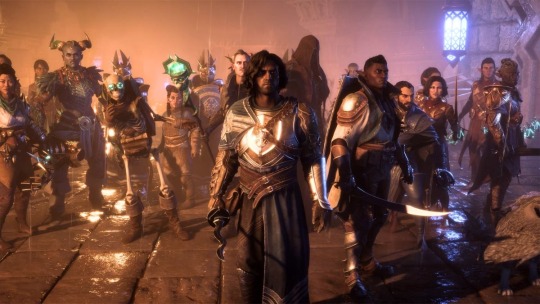
I’ve seen others chide the writing as overly quippy, but that better describes previous titles. Rather, I think The Veilguard’s dialogue is excessively utilitarian and preliminary, like a first draft awaiting refinement. Characters describe precisely what’s happening on screen as it’s happening, dryly exposit upon present circumstances, and repeat the same information ad nauseum. This infuriating repetition does little to reveal hidden components of their personalities, or their unique responses to situations. You won’t hear anything like Cole’s cerebral magnetic poetry or Vivienne’s dismissive arrogance. Many exchanges could’ve been uttered by Nobody in Particular, as it’s just dry recitation after recitation. It almost feels like watching an English second language instructional video, or a demonstration on workplace safety precautions. Clarity and coherence come at the cost of characterization and charisma.
Words alone fail to make them interesting. Most companions lack the subtlety and depth I had come to expect from the franchise, with many conversations amounting to them just plainly stating how they’re feeling. Most rap sessions sound like they’re happening in a therapist’s office with how gentle, open, and uncomplicated they feel. Compare this to Inquisition, where every character has a distinct voice (I should know, I had to try to copy them for that stupid application), as well as their own personal demons that it betrays: Sera’s internalized racism, hints of Blackwall’s stolen valor, Iron Bull’s espionage masked by bluster, or Solas’s lingering guilt and yearning for a bygone age. These aspects of their characters aren’t front and center, but things the audience can delve into that gives every moment with them more texture. The Veilguard’s companions lay out all their baggage carefullly and respectfully upfront, whether it’s Taash’s multiculturalism and gender identity issues or Neve’s brooding cynicism towards Tevinter’s underbelly. You’ve plumbed the depths of their personas within the first few minutes of meeting most of them.
Small exceptions exist. Professor Emmerich Volkarin stands out from the rest of the cast as a particularly inspired character: a charming, Vincent Price-like necromancer. His attachment to tombs and necromancy as a way to cope with his crippling fear of death makes for curiously compelling melodrama. The way in which he ultimately has to face his fear – either by foregoing his opportunity for immortality to save his beloved skeletal ward, Manfred, or by allowing his friend to pass on so that he can transcend into a new type existence – rises above the other binary choices in the game by being both narratively interesting and legitimately difficult to judge. Still, I feel Emmerich’s whole “lawful good gentleman necromancer” conceit, while a unique and clever subversion of tropes, would’ve worked better if it actually contrasted with anyone else in the party. Instead, the whole crew is full of unproblematic do-gooders who are forbidden by the game to nurture any meaningful interpersonal conflict. While I’d appreciate this lack of toxicity in my real-life relationships, fictional chemistry demands more reactive ingredients.

The Veilguard’s developers frequently positioned the game as “cozy” and about a “found family”, but I can guarantee you that there’s more tension at my Thanksgiving dinners than there is anywhere in this title. This family would get along swimmingly even during a presidential election. The thing about the “found family” trope is that it’s more satisfying when it’s earned. Here, it represents the default state, the starting point, and the status quo that they will always return to. Any minor squabbles (Harding wanting to sleep in the dirt, Emmerich taking too many books on a camping trip, Taash not liking necromancy) are introduced and squashed within the same scene. They all feel so extraneous. There’s so little friction among the companions here that you’d think it disproves Newton’s Third Law. The previous games never struggled in this regard, which makes the choices here all the more baffling.
Beyond the intra-party dynamics, characters lack grit or darkness to them – even when the narrative absolutely calls for it. Remember how I described the necromancer as lawful good (to use traditional Dungeons and Dragons alignments)? Yeah, that’s every character. Even the demonic assassin. Lucanis is a notorious hitman possessed by a demon of Spite, and possibly the weakest character of the game. This may or may not be due to the fact that his writer, Mary Kirby, was laid off mid-development. Regardless, he has noticeably less content than the other party members and generally feels unfinished. The demonic possession storyline goes nowhere; he doesn’t exorcise Spite, nor does he learn more about it or how to live with it. Instead, Spite is just an excuse to give Lucanis cool spectral wings (which he will use to fail several assassination attempts). The demon itself mostly just comes across as rude rather than threatening. The biggest issue, however, stems from the absence of any edge to Lucanis. When confronting his traitorous cousin, Ilario – the man who sold out Lucanis’s family to an enemy faction, kidnapped his grandmother, and made multiple attempts on his life – our grizzled, hardened assassin, pushed to the brink, demands… due process. Seriously, if your choices have led Lucanis to have a hardened heart, his method for dealing with the grievous traitor is sending him to jail. That’s The Veilguard’s idea of vindictive brutality among a clan of unforgiving murderers-for-hire. By contrast, Inquisition features Sera insubordinately murdering a stuck-up nobleman for talking too much. I believe that if modern BioWare had written The Godfather (1972), it would’ve ended with Michael Corleone recommending his brother-in-law to attend confession and seek a marriage counselor.
The writers seem intent on making the cast wholly unproblematic, with no way that the audience could ever question their morality or taste the delicious nuance of seeing someone you like do something bad. Measures were taken to child-proof every aspect of the good guys so that they couldn’t possibly be construed as anything else – even if it constricts them to the point of numbness and eventual atrophy.
To make things as palatable and accessible as possible, the language itself was dumbed down. Characters make frequent use of neologisms and bark phrases like “Suit up,” or “These guys go hard.” It emulates popular blockbuster superhero stuff rather than staying true to the diction the series traditionally employed. It’s all about the team, and the entire Dragon Age world has been stripped down into simplistic conflicts and recognizable stock characters.
This is why The Veilguard’s story largely fails. Despite being ostensibly being about the characters, they come off as an afterthought. Most of the time, only the sole requisite follower has anything to say on a given mission. Even in combat, their wholeness as fully-implemented party members falls short of expectations. Their damage output pales in comparison to the Rook’s, they have no health and cannot be downed in battle, and they mainly exist to give the player three extra ability slots. That’s the game’s true ethos for the companions, whether in combat or dialogue – utility, tools to make things happen rather than elegantly crafted identities. We end up with the largest amount of content per companion among any game in the franchise, only to have the weakest roster.
I know these writers can do better, because I’ve seen them do better. Trick Weekes wrote Iron Bull, Cole, and Solas in Inquisition, as well as Mordin Solus and Tali’Zorah in Mass Effect 2 (2010) and Mass Effect 3. Mary Kirby wrote Varric throughout the series, as well as Sten and Loghain in Origins. Plenty of other experienced writers, such as Sylvia Feketekuty and John Dombrow also contributed, so I can’t put any of the blame on a lack of skill. I don’t know if the mistake was trying to appeal to a wider audience, or if the constant reorientations of the DA4 project drained the crew’s passion and left them lacking in time to polish things.
I personally suspect that the writers had to rush out a script for all of the voiced dialogue. A video from August of 2020 showed off the voice actors for Davrin and Bellara, more than four years before the final game’s release. I think the codex entries, letters, and missives that you find throughout the game, which consist of only text, are much better written than the dialogue. My theory is that the writers had more time to revise and spruce up these tidbits, where edits were minimally invasive, as far as production is concerned. But my knowledge is limited; after all, BioWare rejected my application almost a decade ago.
Still, there are aspects of The Veilguard’s plot that I enjoy. The lore reveals were particularly satisfying2, and many felt rewarding after a decade of speculation. I called that elves were originally spirits, as well as the connection between the Archdemons and the Evanuris, but I wouldn’t have guessed that the Blight formed out of the smoldering rage of the Titans’ severed dreams. I’d concisely describe The Veilguard’s story as the opposite of Mass Effect 3: Whereas ME3 did excellent character work, the characterization in The Veilguard leaves much to be desired. Whereas ME3’s tone was overwhelmingly grim, The Veilguard feels inappropriately positive. Whereas ME3’s lore reveals ruined much about the series’s mystique, The Veilguard’s helped tie the setting’s history together. And whereas ME3 fumbled the ending about as much as it possibly could, The Veilguard actually coalesces into a spectacular third act.
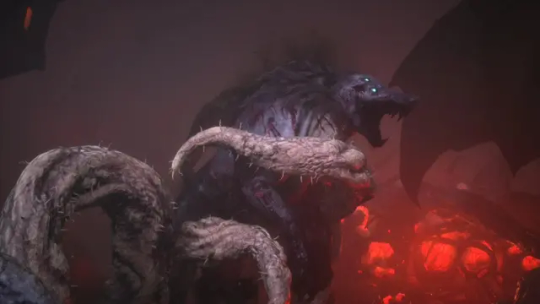
While I think the twist with Varric’s death is weak (outright pitiful compared to the Dread Wolf twist of Inquisition), the actual events that make up the finale carry a momentum and urgency that the rest of the game severely lacked. Everything from the sacrifice and kidnapping of Rook’s companions to the slaying of Ghilan’nain to the awe-inspiring battle between the Dread Wolf and Archdemon Lusacan – the whole affair takes the best parts of Mass Effect 2’s Suicide Mission and elevates it to the scale of an apocalyptic series finale. Ultimately, Solas takes center stage as the final antagonist, and the drama crescendos to a height the rest of the game desperately needed. He remains the most interesting character in the game and perhaps the franchise, and thankfully, the resolution to his story did not disappoint me (though I would’ve preferred the option for a boss battle against his Dread Wolf form if the player’s negotiations broke down). So in that sense, I think the worst possible scenario was avoided.
But is that really worth celebrating? Averting complete disaster? Exceeding the lowest standards? In many regards, The Veilguard still could have been – should have been – more.
IV. A World of Tranquil
In my essay on Final Fantasy VII: Rebirth (2024), I briefly discussed a trend in media to sand off the edges so as not to upset the audience in any way. The encroachment of this media sanitization seems to be an over-correction to the brimming grimness of late 2000s and early 2010s fiction (to which the first two Dragon Age titles belong), which earned comparable levels of criticism. Like Solas, I occasionally feel trapped in a cycle of regret, where it feels like our previous yearning for less aggressive, mean-spirited content led to a media landscape that prioritized patronizingly positive art. Now it’s clear to me that, in order to have a point, you need to have an edge.
Dragon Age historically drew a very progressive audience, and many of them congregated around Tumblr in that website’s heyday. Tumblr has garnered something of a reputation for overzealous discourse and sensitivity among its userbase, and I think that the developers of The Veilguard, in an attempt to cater to one of their core audiences, may have misunderstood both that passion and the fundamental appeal of their products. They became so concerned about optics, about avoiding politically charged criticism, that they kneecapped their world-building, rendering it as inoffensive and sterile as possible. It’s not so much “PC culture” as it is “PG culture.”
To that end, the various governments, factions, and societies of Thedas lost their edge. Dragon Age previously presented itself as anti-authoritarian by showcasing the rampant abuses of power across all cultures. Whether it was the incarceration of mages under the Chantry, the slavery practiced by the Tevinter Imperium, the expansionist anti-individualism of the Qun, the restrictive dwarven caste system, or the rampant racism against elves, social strife abounded in this world. I think that’s one thing that drew so many marginalized fans to the series. But the correlation of fictional atrocities with those of real life frequently prompted volatile discourse, with many concerned about how allegedly allegorized groups were being represented. You began to see countless essays pop up by folks who use the phrase “blood quantum” more than any healthy person should for a setting about wizards. BioWare responded to this by making Thedosian society wholly pleasant and the people in power responsible and cool and the disparate cultures tolerant and cooperative. If nothing’s portrayed negatively (outside of the cartoonishly evil gods), nobody can take offense, right?
For starters, the Antivan Crows have gone from an amoral group of assassins to basically Batman. These figures, which previously purchased children off slave markets to train them into killers, are now the “true rulers” of Antiva, by which the official government derives its authority. The Crows in The Veilguard stand against the insurgent qunari army as heroes of the common folk. They’re not an unscrupulous faction that Rook is reluctantly forced to ally with for the greater good; no, the Crows are simply good guys now. When the pompous governor of Treviso rails against them, with such audacious claims as “assassins and thugs should not represent the citizenry,” we’re meant to laugh at the governor’s foolishness. The unintentional implication this sends is that lethal vigilantism and unchecked power are cool because the people who use it are cool and stylish. The slave trade goes unacknoweldged; Antivan children want to grow up to be assassins now. The Crows never do anything wrong in The Veilguard – the governor is later revealed to be cooperating with the invaders for their own power. BioWare avoids the unpleasantness inherent in the Crows’ concept by pretending it never existed.
Perhaps more ridiculous is the Lords of Fortune, a new faction of pirates and treasure hunters based out of Rivain. Except they don’t really do piracy or treasure hunting. The game goes to lengths to ensure that the audience knows that the Lords don’t steal important cultural artifacts from any of the tombs and ruins they raid. What do they steal, then? There is no such thing as an ethical treasure hunter – plundering indigenous sites for souvenirs is inherently problematic – but the writers wanted to reap the appeal of adventurous swashbucklers without any of the baggage, regardless of whether it makes sense or not3. It comes across as a child’s idea of a pirate: they’re not thinking about the murder and looting, just the funny men with eye-patches who say “ARRR!” The developers want us to like the Lords of Fortune, and to that end, they can’t do anything culturally insensitive – even fictional disrespect toward a made-up culture. This is doubly amusing because the Lords are represented by Isabela from Dragon Age II. The same Isabela that kicked off a war with the qunari by stealing their holy book, the Tome of Koslun. This irony goes unacknowledged by the game.4
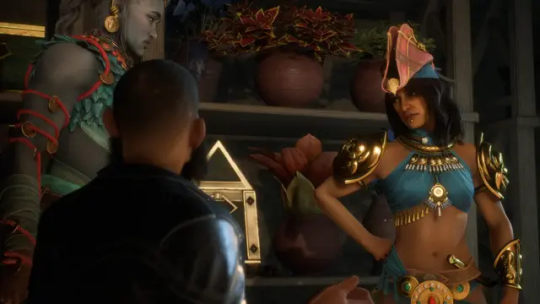
When these rogue buccaneers aren’t busy giving land acknowledgments to displaced Dalish elves or whatever, they’re enjoying their nonviolent coliseum. Pirates revel in bloodsport, but only so long as no actual blood is spilled. The Lords refuse to fight prisoners or animals in their arena, as they find such acts too cruel. I guess they’re all big Peter Singer readers. Instead, they summon spirits to adopt the visages of common enemies so that the player can kill them with a clean conscience. It’s another example of wanting to have your cake and eat it too – they wanted to create a glory hunter/gladiator faction, but couldn’t stand the underlying implications of such. So they twisted and bent them to fit into their unproblematic paradigm, leaving the Lords flavorless and lame. They barely even contribute to the main story, and they’re practically the only look we get into Rivaini society (which remains criminally underdeveloped).
More tragic is the handling of the qunari, once one of the most unique and nuanced civilizations in the Dragon Age setting. The Qun, as portrayed in the first three installments, is a society that demands all of its composite parts work in harmony. Thus, they have predetermined vocations for their children, rigid gender roles, strict codes of conduct, and an ambition to “enlighten” the rest of the world. While the Qun has often been presented as antagonistic toward the heroes, the series has commonly balanced its portrayal by showing how seductive its absolutism can be for people without hope. In some cases, life under the Qun is preferable, as is the case with former Tevinter slaves. Conformity becomes comfort when the world is regularly threatening to split apart.
The Veilguard opts for a different approach. See, Rook’s not fighting members of the Qun in this game – they’re fighting the Antaam, the former qunari military. The Veilguard constantly reiterates that the Antaam, which makes up one of the three branches of the Qun, has broken off and decided to invade, pillage, and stoke chaos. BioWare didn’t want the questionable morality and complexity of fighting an invading people from a humanized, multi-faceted culture, so they removed their culture. Their efforts to turn the non-Western-coded qunari into something digestible for their mistaken conception of a modern audience instead results in two caricatures: one being a fetishized, perfect society where there are no perceivable social ills; and the other a bunch of rampaging brutes.
Contending with a realized conception of Plato’s Republic mixed with the Ottoman Empire makes for more compelling drama than a horde of murderous giants. Again, BioWare wanted to have it both ways, and they still needed nameless, faceless orcs to kill. So every bit about the qunari’s militancy, imperialism, and repression coexisting alongside some of their more progressive ideas and communal unity is stripped of its context and meaning. Blame is placed solely on the Antaam, who no longer represent (and retroactively, never represented) the Qun’s ideology. It’s a cowardly compromise, attempting to pin the blame of all the Qun’s failings on a renegade military and seeking to exonerate the political and social apparatuses of their culpability.
At one point, a minor character named Seer Rowan lectures to an ignorant human (a proxy for the audience absorbing these retcons) that qunari society has always been egalitarian in practice, with mages enjoying freedom there. Previous games showed that the qunari shackle their “saarebas” mages, stitch their mouths, cut out their tongues, and teach them to commit suicide if they ever stray from their masters. However, we’re now assured that this is only practiced under the Antaam, and No True Qunari would ever do such a thing. Ignore the fact that, in Inquisition, we witness the enslaved saarebas under the supervision of the Ben-Hasserath, a subdivision of the Ariqun (i.e. not part of the Antaam). In fact, the Antaam that Rook fights in The Veilguard never command saarebas at all. They’re completely absent from the game (likely because the image of the bound, mutilated minority was too much for The Veilguard’s sensibilities). Seer Rowan’s weak, conciliatory retcon can’t even justify itself in its own game. The scolding diatribe communicates an intrinsic misunderstanding of the Qun by the writers – namely, it continues the pattern established with the Antivan Crows that the mechanics of power in society are fundamentally good as long as aberrant forces aren’t in charge. While I understand the desire to be conscientious about the portrayal of fictional cultures that draw upon non-Western traditions and iconography (which have historically been demonized in media), glamorizing the Qun and stripping it of its realistic nuance does little to alleviate any problems with representation. If anything, it creates new ones.
But hey, now we have our faceless orcs to guiltlessly slaughter. That’s what the Antaam’s been reduced to, bereft of the ideology that made them people. We kill them because they’re strange and scary and foreign and seeking to destroy our cities for fun. They remain the most prominent representation of the qunari in-game, barring our party member Taash. BioWare’s attempts to reverse what they viewed as problematic components to the qunari instead devolved into the very tropes they wished to avoid.
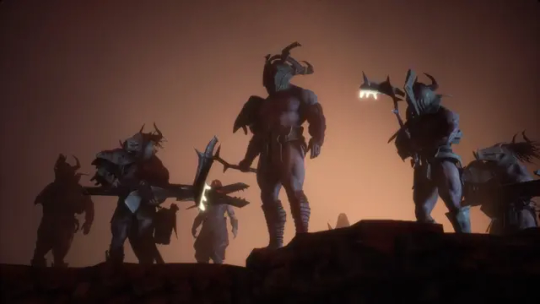
Which leads us to the elves. Much of the series’s discourse has surrounded the portrayal of the long-suffering elven people, who endure slavery under Tevinter, expulsion from their homeland in the Dales, confinement in ghettos, and the general disdain from other races. The games’ stories use symbolic shorthand of real-life oppressed peoples to communicate these tragedies, and this has led to a variety of intense, emotional interpretations over the years. The unending misery of the systematically marginalized elves hasn’t gone unnoticed by the fanbase – and their criticisms haven’t gone unnoticed by the developers. To quote The Veilguard’s creative director, John Epler, in an interview with Polygon:
“Dragon Age has not always been the kindest to the Dalish [elves]. Somebody once made a joke to me, and it’s not untrue, that it’s possible to wipe out a Dalish clan in all three of the games in some way.”
He and others on the development team must’ve thought elves needed a break, because the omnipresent racism against them vanishes completely in The Veilguard. Tevinter, an empire built on the back of chattel slavery, doesn’t show any of that. Consequently, it feels like players in the know still haven’t seen the true face of Tevinter, despite spending half a game there. The notion that the capital of Minrathous gives now is one of a prosperous city that’s centuries ahead of the countries down south, rather than a cruel regime cracking the whip at every opportunity. Perhaps the writers weren’t comfortable portraying this, or felt that their audience might not be amenable to it after years of incendiary argumentation. Nevertheless, it castrates their established world-building and robs us of the opportunity to witness true elven liberation in the climax. With both the fall of Minrathous and the toppling of the tyrannical elven gods, we could have delivered a much needed catharsis after four games of oppression, but The Veilguard forgoes this storytelling opportunity to play it safe.
I worry that this hesitancy originated from anxieties about the sensitivity of depicting marginalized peoples in brutal, dehumanizing conditions, and how that might look to more fragile viewers. But I think it’s important for all players, watchers, and readers to know that, though there might be aspects shared between them, fictional minorities are distinct from real ones.
Dragon Age’s elves are aesthetically Celtic. Their residency in alienages evokes images of Disapora Jews in Europe. Their Long Walk after being driven from the Dales calls back to the Trail of Tears, sharing an experience with Native Americans. Their subsequent migratory nature is reminiscent of the Romani people. And their ancient empire of Arlathan, with its large columns and temples of worship, headed by ascended humanoid (for lack of a better term) deities that cast down an enemy called the Titans, and which has since had its religion and culture co-opted and renamed by Roman-inspired Tevinter invites comparisons to classical Greece.
My point is, the elves of Dragon Age don’t represent one group of people, because fictional cultures are constructs drawing from countless inspirations. If they represent anything beyond themselves, it’s the idea of a proud people that’s fallen under the yoke of conquering powers – a supervictim to embody all. The idea that one must be limited in their storytelling options based on how the portrayal might reflect upon or disrespect an existing culture is flawed, in my opinion. In the overwhelming majority of cases, coding cannot be read as a 1:1 allegory, especially in speculative fiction like science-fiction and fantasy. I believe the most mature way to evaluate a story isn’t to try to pigeonhole what it’s trying to say say about who, as if there’s some insidious encrypted message in the text. Rather, it’s to see the forest through the trees and interpret the work as a complete whole in itself.
On that basis, I ask: would it have been so bad to see some of those enslaved elves, praying for salvation, side with their manipulative, nefarious gods? To add some nuance to the conflict with Elgar’nan and Ghilan’nain, would the story of elven liberation not have been better if the game actually engaged with it? Could we actually have a moral quandary with those whom Rook ends up fighting, even if the content might be seemingly problematic?
Epler might respond in the negative, per the Polygon interview, claiming that the gods “simply don’t care” about the elves.
“Those blighted, decrepit gods, they’re not bothering with the soft pitch. Their pitch is, We’re going to make a horrible world. We’re going to give you a lot of power, and maybe you’ll be OK.”
Like a chess board, the core conflict of The Veilguard is black and white. BioWare abandoned the chance to make Elgar’nan and Ghilan’nain more interesting villains because it was too risky.
Similarly risky was Solas’s role as an antagonist, since his motivations, as explained in “Trespasser”, are deeply sympathetic. Perhaps too much so for the developers’ comfort. Unlike the Evanuris and their disinterest in the elves, Solas wants to restore the elven people to their former glory. At least, that seemed to be his pitch in the last game. Frustratingly absent from The Veilguard are the Agents of Fen’Harel – elves who swore fealty to Solas’s cause. They infiltrated and compromised the Inquisition, effectively precipitating the final decision to end the organization in its current form. The idea that Solas had amassed an army of common folk who found the idea of a renewed elven empire appealing made him appear formidable and intimidating. “Trespasser” implies that a mass uprising of elves under Solas’s leadership was imminent, and anyone could be in on it.
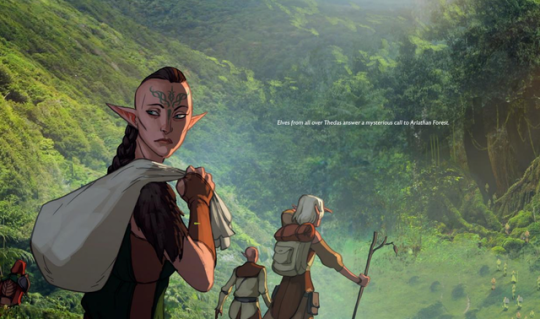
None of this happens in The Veilguard. Not only does Solas lack an army, but their absence isn’t explained or even acknowledged. As a result, Solas remains a passive antagonist until near the end, since the player has no disciples of his to contend with (either physically or ideologically) along the way. It wastes a side of his character that had been foreshadowed in a decade-long cliffhanger – that of a charismatic leader, capable of coordinating a rebellion that could spell disaster for its own followers.
In a Reddit AMA after the latest game’s release, Epler answered where the Agents of Fen’Harel disappeared to:
“Solas’ experience leading the rebellion against the Evanuris turned him against the idea of being a leader. You see it in the memories – the entire experience of being in charge ate at him and, ultimately, convinced him he needed to do this on his own. And his own motivations were very different from the motivations of those who wanted to follow him – he had no real regard for their lives or their goals. So at some point between Trespasser and DATV, he severed that connection with his ‘followers’ and went back to being a lone wolf. There are Dalish clans who are sympathetic to his goals, but even there, there’s an understanding that he’s too dangerous to have a more formal connection with, and that he will, ultimately, sacrifice them to his own ends if necessary.”
I find this explanation unsatisfying, not the least bit because the narrative offers next to nothing to imply this. The disappearance of Solas’s agents represents my biggest bugbear with the game, depriving it of the full potential of its highly anticipated antagonist in favor of the more generically villainous Evanuris. Moreover, this omission fits into the aggravating blueprint for The Veilguard’s inoffensive direction. The motivations, emotions, and backgrounds of the Agents of Fen’Harel would be sympathetic, and therefore might problematize the otherwise cut-and-dry conflicts. Epler seemed concerned that audiences might think Solas was “a little too sympathetic in his goals,” according to an interview with GamesRadar+.
But that’s the thing: sympathy isn’t endorsement, and portrayal of sympathetic characters isn’t endorsement either. But neither does that invalidate the emotions and experiences that generate that sympathy, even if the character’s actions ultimately turn toward evil. I’ve noticed a trend (especially in symptomatic criticism, which I generally dislike5) to view art as propaganda, and to evaluate it from a moralizing, top-down perspective. Antagonists with complex or understandable motivations (in this case, revolutionary villains) are often judged by this framework as tools for stories wishing to champion the status quo. Common arguments that I’ve seen imply that the relatability that we often find in villains is not a strength of the writing, but a devilish trick of ideology by which writers can reinforce conservative doctrine, to scold us away from certain beliefs. Any decent writer knows this isn’t the case, and that people don’t write morally or emotionally complex antagonists for didactic purposes. Instead, characters such as these embody the anxieties of their creators – the fear of losing yourself to your passions, the fear of going about things the wrong way, the fear of sacrificing too much to achieve your desired ends. The concepts and feelings that compel these characters remain authentic to the writer’s heart and the connection they established with the audience.
Art isn’t propaganda. To read it as such reduces it and promotes intellectual dishonesty and foolhardy myopia. Stories are irreducible (otherwise, we would not waste our time with them), and so I believe interpretations should be formed from the bottom-up, rooted in the text as much as possible. The “message” cannot be imposed from the top-down, but symptomatic readings, in their focus on tropes and cultural context, frequently condemn without a trial. Hindering your story in order to future-proof it for the sake of optics is a safeguard against this, and one that leads to bad stories. Artists should have confidence that their text will hold its ground on its own. To quote Ursula K. Le Guin’s essay “A Message about Messages”:
“The complex meanings of a serious story or novel can be understood only by participation in the language of the story itself. To translate them into a message or reduce them to a sermon distorts, betrays, and destroys them… Any reduction of that language into intellectual messages is radically, destructively incomplete.” (67-68)
BioWare’s doctrine of passive writing violates this wisdom by surrendering to their fear of (bad) criticism. The Veilguard lacks punch, stakes, and empathy and becomes incongruous with its established lore because it’s not willing to take risks that might alienate or upset players. They’re more concerned with making sure their work is inoffensive than they are with conveying a moving story.
I believe all of this was inherited from an incestuous feedback loop between a vocal minority of critics, of which I might’ve once counted myself among the blameworthy, and the apprehensiveness of out-of-touch corporate board room decision-making. Dragon Age’s genome mutated, and it slowly lost its teeth.
Over the course of a decade, we bred the Dread Wolf into a Dread Pug.
V. What It Took
The Veilguard’s lack of confidence in itself and lack of faith in its audience contribute to its capitulatory nature. In many respects, it feels like the developers lost their passion for it over the course of the ten year hellish production and just wanted to be done with it. This resulted in a decent game that nonetheless feels divorced from what came before it. It tries to juggle being a soft reboot while also trying to close out the series’s biggest and longest running story arcs, but inevitably fumbles.
Nearly everything done by The Veilguard was handled better by Inquisition. And Inquisition was certainly the more ambitious title. Perhaps more returning characters would have established a sense of continuity between the two, or at least made it less awkward by having them present for the story’s grand finale. For as strong as the endgame is, it could’ve benefited from the presence of slave liberator Fenris, elven history aficionado Merrill, possible Evanuris soul vessel Sera, or Divine Victoria (any of them). The core pillar of Dragon Age is the characters, and The Veilguard’s under-performance (and in some cases, outright dismissal) in that regard sabotages its integrity. Without this to anchor it, the changes to gameplay, visuals, and roleplaying depth become more alienating.
Personally, what do I take away from this? The Veilguard is far from the game I dreamed about for ten years, and not the one that loyal fans deserved either. I’m no stranger to disappointment at this point in my life, and yet this still leaves me with a hollow feeling. Will I still be able to return to Inquisition, a game I truly adore, and see it the same way as before, knowing now where all this is leading? The true cost of The Veilguard, for me, has nothing to do with the price tag: it’s the loss of that perfectly tailored dream, now that the possibilities of the future have shut their gates.
Where do those dreams go? Are they doomed to fester in their lonely, incommunicable agony? Will they be twisted by their enmity, like the blighted dreams of the Titans, and spread their corruption into those important happy memories?
In 2014, I was depressed as fuck, and Dragon Age: Inquisition helped me to see the light and come out of it. In 2024, I was depressed as fuck, and Dragon Age: The Veilguard made me feel nothing. There’s no less favorable comparison in my eyes. It’s disheartening to behold something that once meant so much to me and be greeted with numbness. I have to wonder if that affection will ever return, or if I’ve just grown out of it.
But as I wandered the streets of Minrathous as Rook, I heard a familiar song. It was one of the tavern songs from Inquisition, its nostalgic chords filling me with wistful sentiment. I know, deep down, there’s still something there. Maybe I just need to dig it up. Maybe it’s time to look back…
To be continued…
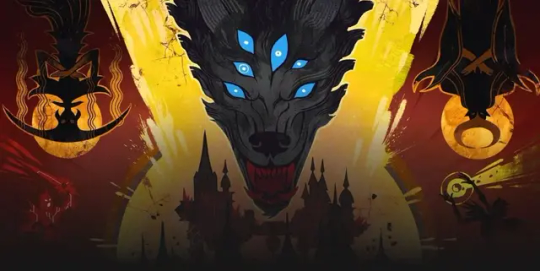
– Hunter Galbraith
Further Reading
Le Guin, Ursula K. “A Message about Messages.” Wonderbook: The Illustrated Guide to Creating Imaginative Fiction, Abrams Image, 2018, pp. 67–68.
Incidentally, this was an anomaly my friends and I pondered over and eventually solved. It turned out to be a former Wienerschnitzel. ↩︎
You could argue that this credit goes more to Inquisition and the previous games for laying the groundwork for said reveals, which were obviously planned out ahead of time, as confirmed by the aforementioned official artbook. Regardless, the payoff satisfied me and gave me proper closure. ↩︎
I’ve been informed that there is a hidden conversation that explains that the Lords of Fortune do, in fact, sell cultural artifacts at times, but only to the rightful owners. This just makes me wonder what they do with the artifacts if the prospective clients can’t pay. Do they shove them back in the ruins and re-arm all the booby traps? ↩︎
I would argue that this does not represent character progression on Isabela’s part, as her (possible, depending on the player’s choices) return of the Tome of Koslun in Dragon Age II was a pragmatic sacrifice she made to save her friends and the city, rather than an acknowledgment of the qunari’s inviolable ownership. In fact, in many continuities, she never returns the Tome at all. ↩︎
I prefer more formalist criticism because it allows the text to lead the dance, not the critique. I think it’s only fair, given that the creators likely spent more effort crafting the piece than I spent consuming it. Symptomatic criticism mandates that the reader consider everything around the text, typically at the text’s expense. In the worst cases, symptomatic critics make their arguments about seemingly everything besides the text in question. ↩︎ Link to article: https://planckstorytime.wordpress.com/2025/01/01/dragon-age-the-veilguard-strangled-by-gentle-hands/
#planckstorytime#writing#analysis#essay#dragon age#datv spoilers#datv rook#dragon age veilguard#veilguard#dragon age inquisition#solas#lace harding#bellara lutare#davrin#elgar'nan#ghilan'nain#neve gallus#taash#lucanis dellamorte#emmerich volkarin#video games#rpg#bioware#dragon age 4#dragon age dreadwolf#da4#tevinter imperium#dorian pavus#inquisitor lavellan#solavellan
293 notes
·
View notes
Note
hi! i see you posting about the raven cycle like, pretty much daily. i’ve Tried to read it but i wasn’t really sure if i was digging the vibes so i moved on to something else. but like dude i keep seeing your posts and it makes me feel left out lmao. i would be most grateful if you gave a few reasons as to why someone should read the raven cycle/why You like it
AHHH THIS IS EVERYTHING TO ME. Permission to gush about The Raven Cycle? God, this is like a special little present. I'll do anything to about these books. ANYTHING. That you'd come to me means everything, actually.
Buckle up, get some tea or pop or water or just your attention this will be quite a bit.
The Raven Cycle is a very specific vibe and it isn't everyone's cup of tea, which is unfortunate but it is a matter of discerning what you enjoy about media or what you like to take away from books. I try to stray from just going "oh here's a handful of literary tropes which make this worth reading" cause I could talk about how it's got gorgeous queer rep, or it's found family, or disguises itself as dark academia but it's just identity exploration under the veneer of a magical realism story. But that doesn't do anything to convince someone to read it, imo. So here goes:
So, here's like... my ultimate brainrot in this regard. Starting with tone/structure, which is where people get lost I've noticed. Because I think this series is a slow build to something gorgeous. I'll say the first book is meant to raise questions, introduce conflicts and the overall energy of the series. You'll encounter red herrings, false leads, etc. It's kind of an acclimation to the world. If you're hooked about halfway in, that's the point. The plot takes a minute to kick in, but please remember it's not all about the plot. The plot is here to carry the characters and their themes and magic and journeys. This carries throughout the series. The plot is to transform the characters not the other way around. This is a character driven series. More on that later. The second book (The Dream Thieves) FUCKING BANGS. I would argue it's the best written of the series, even if it isn't my personal favourite (BLLB my beloved) i want whatever Maggie Stiefvater was on writing it. I'd describe the series like having an incredibly vivid dream. You'll wake up and something feels different, you've been affected, but the details might slip by. Which means periodic rereads to immerse yourself again. And as you reread, the more foreshadowing and details you pick up on. So structurally, it's great for annual rereads. You'll see people call it all vibes, little plot. Which... fair.
So here's a breakdown of things I personally enjoy. Because I love organizing my thoughts into structured lists. I'll keep it as spoiler free as possible, because I went into this entirely blind and I was rewarded heavily for it.
1. Plot
I know I just went off about how the real plot is the friends they made along the way but actually I love the plot. The initial conflict you're told to worry about (remember what I said about false leads lmao) is the idea of the MC kissing her true love and killing him. And this informs a huge piece of the story, of course. It's pretty uhhh it's a pretty big deal. But this aspect of the plot, I think, works better for individual characterization and future conflicts. It's touched by the real plot, but not as entwined as you're lead to believe.
The real plot is more of a quest, a venture into a lost king who our ensemble cast (once again, false lead, it's not about one person it's about the entire group) is looking for. They uncover decades of history and magic, and form a beautiful friendship along the way. The plot is not the destination, it's the journey. Don't focus entirely on how they're going to find Glendower, focus on how they get there. Learn WHY they want to find Glendower. What are their motivations? Why do they want to aid Gansey (one of the character)? What is the draw, the appeal? Why is it so important to them? And how does the search shape them as people and shape their relationships with each other? I see people go into The Raven Cycle expecting a typical adventure book and so they hone in on the wrong details - which is not their fault, the book was poorly marketed. Just remember it's less about Glendower, it's the friends they made along the way.
2. Characters
"If the plot isn't important these characters have to be revolutionary to carry seven books" is a statement I'm sure has come across your mind. If it hadn't prior, now it has! I've put it in your head. Because YES. That's the point.
These characters so multidimensional. There are crevices and flaws and beauties and diamonds in the rough. Each character dances with YA tropes but breaks from that mold. A giant piece of the series is how characters present to the world, how they feel about themselves, and who they wish they could be. And as readers, we are tasked with peeling these layers back. Brief overview and its not a proper character analysis because I don't want to go on for 100k words.
So, say, this character who presents himself as very prim, presidential, composed. He is always, to the surface, in control of the room. Yeah, he's actually a ball of anxiety. He is obsessive and probably autistic. He is taken over by this quest, he has honed in with a singleminded focus on this search for Glendower. He seems condescending and pretentious - he doesn't even register he is doing this half the time, and a huge piece of his character is the power of his words and how he uses them. He doesn't mean to hurt with his words, it just spills out. He cares, and he cares so much it inadvertently hurts and offends. He speaks like a grandpa. He was on the rowing team. He builds towns out of cereal boxes. Another character seems like your typical "omg dark and broody he's so cool and mysterious". He's actually like that because he's coping with some intense mental health issues, he is scared of being left behind especially after some very specific familial trauma. He's also very sweet, possibly the most softhearted in the group. He saves a baby bird. He loves with every bone and synapse in his body. He's catholic. He has a nut allergy. He swears every other sentence. He is a pack animal and he snarls because he protects the people who mean the most to him. He doesn't do casual, in friendship or romance or in his day to day. He's a perfectionist. He hates school. He's top of the class in Latin. Our main girl, the one you've probably read about already, looks like a manic pixie dream girl. She could've easily become your stereotypical YA bland female read. She has so much personality it spills over to everyone else. She is teeming with it. She's practical and sensible and wishes she wasn't. She sews her own clothes and has a peculiar haircut. She is a teenage girl. She is very sure of who she is. She has nuanced female relationships with incredible heft and weight. She loves nature and trees and her boys. She meets a cute boy and has a very realistic response to this. She's a feminist and calls out people who mistreat her. She has boundaries and stands by them. She's stubborn and a little judgemental. She is so sixteen year old girl in that beautifully complex and confusing and tumultuous way. Another character is a mess of contradictions. I can't even begin to explain him he's so djsjdjsj. He's an asshole. He's quiet. He's notably off putting. He's not shy he's methodical. He believes in the tactile world but he believes in his friend more. He's honest, but only because he isn't very good at lying. He wishes he could be himself. He feels trapped. He wants to be his own person. He values his autonomy over anything. He'd be a villain if he didn't love his friends so much. He's not an uwu soft boy he's a fucking menace. He has the most moral flexibility in the cast. He has a strong sense of justice but he defines that on his own terms. He is horny. He is pragmatic. He works three jobs. He's top of his class. He hates rich people. He wishes he was one of them. He's unknowable. He's a mechanic. He has boyish hands. I can't talk about the other two because they're spoilers - all I can say is one tells you exactly what the fuck he is from the start, and the other is the MC of another series who got plopped into this one and made it everyone's problem. Also robobee.
These characters are so... they mean everything to me. They are so multifaceted and realistic and raw. They're teenagers and you KNOW they're teenagers. They've all been through unspeakable trauma and trials. This book demands you go on this journey with them and you accept them for their flaws, their delights, their triumphs, their sharp edges. They are the most characters of all time. I am not doing them justice. They are so REAL. There isn't a "fan favourite" because there's something appealing about each of them. There's so many minute details to read too much into. And it's fun to analyze characters with these miniature context clues. I read these books as a high schooler, and to this day Adam Parrish is one of my favourite characters ever point blank. There's a rawness to these people that sticks with you.
We read the books and the more we learn about the characters the more real they become, almost like you're earning their authentic selves. I'd say the characters are the strongest piece of these books, by a LONG shot.
3. Writing Style
Just taking a more technical stance, I think the most appealing part of the series for me is Maggie Stiefvater's writing style. It's, put simply, absolutely breathtaking. I think specifically she has a tremendous ability to make what should be a very mundane sentence feel magical. I think there's a fine line with flowery writing where it can feel pretentious if it doesn't work for what the author is trying to do, or if they don't pull it off. She pulls it off beautifully. So let me just share a few of my favourite (spoiler free!) passages I keep in a notes app on my phone:
My words are unerring tools of destruction, and I’ve come unequipped with the ability to disarm them.
He was full of so many wants, too many to prioritize, and so they all felt so desperate
He'd chosen his weapon well: only the truth, untempered by kindness.
Being Adam Parrish was a complicated thing, a wonder of muscles and organs, synapses and nerves. He was a miracle of moving parts, a study in survival. The most important thing to Adam Parrish, though, had always been free will, the ability to be his own master.
Because I am overfull on secrets and underfull on friends.
Consider this a sampler platter. She has a way with words i can't even begin to describe, one that has influenced my writing style substantially and I imagine many others. Saying a phone "fussed for attention" is such a unique way to turn a common phrase on its head. This series was MADE to be annotated.
(For reference, these are my annotation copies)
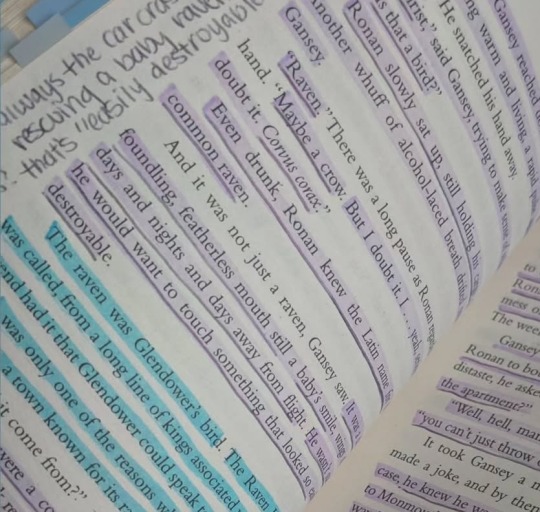
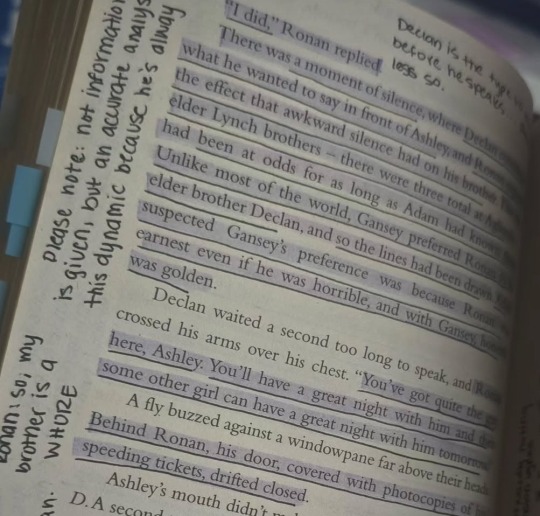
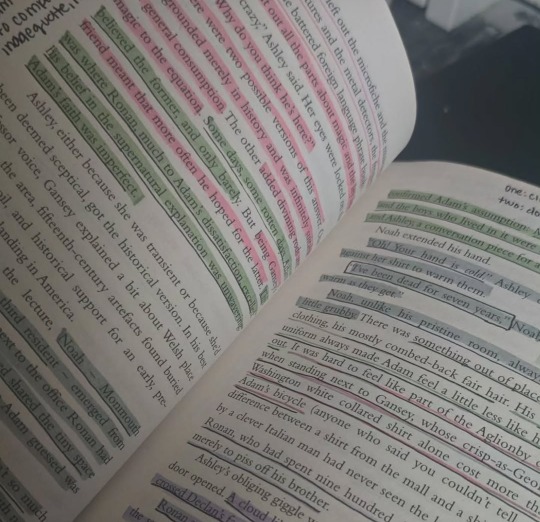
She's so deliberate with her word choice, she cycles through and repeats phrases to make a point. When I call a writing style something like poetry, this is what I mean. She changes her narration structure to illustrate how characters comprehend the world. She does a very specific thing that i can't say without spoiling you, unfortunately, but involves the repeating of a word or phrase or concept to drive a point home. There's a turn of phrase that gets used in the beginning of first book involving the days of the week and gets used again at the end of the seventh book (third book in the second series).
What's more is it makes sense for the themes and tone of the series. Remember how I said it feels like a disturbingly vivid dream? Yes, it's largely because of how she writes. There is something enchanting about this world, this intimate and focused story.
4. Relationships
In my brief introduction, I mentioned found family. I think codependent queer friend group would be more accurate, but however you describe it this series is about friendship. Famously, the author kept a sticky note that the worst thing that could happen is them not being friends. And this is crucial to the series. I'd say after the individual characters, the relationships are the biggest draw.
Notice, of course, that I'm not separating romance and friendship. Half because all the romances START as friendships, and half because the relationships are all put on equal ground in that aspect. The Raven Cycle takes great care to show all forms of love as equal and necessary for each character. It was marketed as a romance, but I think describing it as a more general love story would work. These characters, who shouldn't work together, fall in love with each other throughout the series. In all forms. Platonic, brotherly, romantic.
Each character has a unique dynamic individually with another, even the ones who don't interact very much. Whether that's from brotherhood, divorced parents core, attempts at dating, belligerent friends who encourage one another to commit crime, etc. Take any character, pair them with another for a chapter, and it will work. It will make sense. I think in a lot of ensembles certain duos get neglected, but the series balances this issue very well. They all love each other, obsessively and with such devotion that the only reason they get through all the horrid things they do is because they love each other. Their faith and dedication to one another fills so much of the heart of the series.
Additionally, (and if you follow me you know but I'll be vague just in case?) the romance is... w o w. Just wow. If you're into shipping, then welcome this is... wow. I wouldn't classify the series as a romance, because the romance is so intertwined with the friendships and it's very subtle buildup. It's more of a backdrop, right? It's definitely there, but it isn't the only thing going on. Once again, an aspect I enjoy. The romances take up just as much time and weight as the friendships. You essentially get three romantic arcs (with the situationship that shan't be named bc its a walking warning [redacted] you will always be famous i need to put him in a jar) and each serves a crucial purpose. An initial romance which serves as a sort of catalyst for the others, where both those characters separate and find romantic relationships that fulfill their needs and help their character arcs. The series is very into soulmates and fantastical pining and hand holding and friends to lovers and falling in love in the little moments. Also there's a very religious element to one of the romances, which I've always eaten up and I think it's beautifully done. I'm not describing it well, because frankly it's spoiler heavy to discuss the romance too extensively. But once again, these relationships and friendships have consumed me for YEARS now, if that's an indication of how much I adore their relationships. And don't be misled, the relationships are very different. It's not copy pasted. If i had to assign like... specific tropes I'd say one is kind of a doomed soulmates and secret relationship and the other is a slow burn with some batshit fucking pining also cunt4cunt. And yes, there is queer romance. More on that later.
To round out this aspect here's two quotes that make me absolutely batshit, with the names redacted to avoid spoilers:
Why do we breathe air? Because we love air? Because we don’t want to suffocate. Why do we eat? Because we don’t want to starve. How do I know I love her? Because I can sleep after I talk to her.
[Redacted] lived in an apartment located above the office of St. Agnes Catholic Church, a fortuitous combination that focused most of the objects of [Other Redacted]'s worship into one downtown block
In that moment, Blue was a little in love with all of them. Their magic. Their quest. Their awfulness and strangeness. Her raven boys.
Yeah, have you ever been sixteen and reading this for the first time? Yeah, I could've been doing crack but it wouldn't have the same high i got reading all these for the first time.
Anyway.
5. Humour
I mean. Listen, I'm a funny person. I'm hilarious. I like to think I'm a great metric for what is or isn't funny, and not to brag but I'm good at making people laugh. Trust my metric, if there is one thing I have in this world it is that I am funny and I know funny material.
So trust me when I say this series' sense of humour is so utterly bizarre and wild and delightfully funny. Maggie Stiefvater has a weird ass sense of humour and I love it. She'll string together the most heartwrenching sentence about feeling like an empty hole with nothing inside and the most beautiful metaphor for depression and mental health I've ever seen, then bust out "WAKE UP FUCKWEASEL" and you cant even be fazed at this point because it's book two and you've read almost 500 pages of this bullshit. Ronan Lynch is owed royalties for saying some of the most off-the-rail bullshit i have ever seen.
"With a sigh, Ronan took a photo of his elbow bent to look like a butt, texted it over, and got up." "the sea of clusterfuck" "never-never land of space time fuckery" "yeehaw" (multiple accounts! btw!) "'What the fresh hell is this' Gansey said pleasantly'" and I'm not even going to touch the whole heaven-usurper meltdown because hey what the fuck that was insane. This all sounds like nonsense but the fact that all of these are bracketed by something like "if you never saw the stars candles were enough" or "people shout when they don't have the vocabulary to whisper" is fucking insane.
These books are so delightfully weird kid core. Like hell yeah. It makes me laugh. There is something wrong with Kavinsky especially but damn it he's so funny. A solid character moment involves two characters faking an argument in public to preserve the others reputation for hating rich boys and this is like a legitimate solid moment for this relationship and it's so she'll get in the damn car. That's it. I love these books. One character wears boat shoes and we should probably ridicule him for it but he's also very cute so he gets a pass. There is a toga party. Copious discussions of a fake song used to torment the entire crew. Robobee.
6. Sexuality and Queer Themes
This series is inherently very queer. Not even talking about the canonically queer couple that I sold my soul to in tenth grade. No, I mean tonally. The second trilogy explicitly describes this friend group as delightfully queer, and i think that warrants pointing out. All the characters are either implied to be some brand of fruit or fruit adjacent. Like artificial banana, at least. I digress, it's part of the gay bird book trio for a reason. Found family is a queer trope and one of the characters was literally raised in an all female witch commune. Also like... a lot of genderqueer coding occurs. And I think one of the characters all but describes himself as aroace, which this series doesn't quite use labels so I take it as confirmation but I digress.
Besides the obvious as stated above, and the confirmed queer characters, the series has a very nuanced and refreshing perspective on queer relationships. One of the characters grapples with his queer identity in the second book, is battling a lot of internalized self hatred which happens to intertwine with sexuality - and its not exactly gayngst (though it's not... not gayngst) but tied into an aspect of his personality that I can't really speak on without spoiling. But his acceptance, almost, of his identity and who he is happens to include being gay. It's not so much a realization but a "Ok i am good with myself and by extension I am comfortable admitting my sexuality because I am working on accepting myself." This gets juxtaposed with a character who IS struggling extensively with his sexuality, is horrid and vile (and so fucking fascinating) and disrespectful of boundaries and its made very clear struggling with being gay is a part of this. I worry I am not explaining this well but the two bounce off each other in this regard and it was actually oddly refreshing to see how this was executed. They're foils, in this way, and it solidifies the first characters acceptance of who he is. It's orchestrated beautifully. And while I won't disregard religious guilt, I don't think the religious aspect is so entwined in the internalized homophobia so much as it's tied into all this characters self loathing. It's intentionally a vague storyline in these regards, because a lot of it is up to interpretation - but the character being gay is NOT. You as the reader can decide what his precise relationship was with it and what this journey means, but it does tie into self loathing.
And not to harp on further, but there is a very lovely bout of bisexual rep. Once again, it's not explicitly stated as bisexuality but like... that is a bisexual. Trust me. Shows attraction to men and women equally (though in different brands, which doesn't always happen with bisexual characters! He's allowed to have types, to experience attraction to different genders in different ways. I really really like that.) His sexuality is quieter (as is the character), in my opinion, not so much in its not there, but it's not a hefty part of his individual arc. And this character could have easily had a queer angst arc. He doesn't. He has a romantic crisis, yes. But his bisexuality is a part of himself he doesn't gripe and stress over, at least to my interpretation. His sexuality is one part of many things that represent him - being quiet but also quite loud, embracing yourself and your potential. I cannot stress enough that it is important to who he is, but it's really really refreshing as a bisexual person to see a character just... be bisexual. He hides a lot about himself, and he comes across more as a "no one asks me so I don't offer it but I'd be open if someone did." Not the point, but I have a very special place in my heart for bisexual representation that breaks the typical mold. He goes on to be very open and comfortable in it.
Some more subtle aspects of sexuality: a character describes himself in a way that insinuates he is aroace, and considering how little labeling occurs in the books, I think it's safe to see this character is likely aroace. But we spend very little time with him, as he's only with us for one book. Still, a win is a win. Also the second series has sapphic characters (MANY actually) but let me convince you to get through the first. The second series is somehow even more flagrantly queer than the other. Gays everywhere. I sound ridiculous, I know, but queer rep is very important to me, so ofc I highlight this as important.
7. Trauma, Grief and Healing
I'll keep this brief because this definitely veers into spoiler territory.
I could keep this in a bulleted list, but I think this point is one of the reasons I especially appreciate this series. I've alluded to a lot of particular traumas the characters have dealt with, many parental, and I want to take a minute to say that the series handles the arc of growing and healing in a very nuanced and realistic way.
Its very common, i think, to sand down the ugly aspects of undoing years of abuse, the aftermath of losing parents, how a near death experience warps you, how death affects you. And the series doesn't shy away from that - it's actually a main focus for several of their arcs, and the focus on the healing process is so so incredible. Like I said, I'll kept it as spoiler free as possible. How does it look to move forward when you've left an abusive home? As you undo years of repression and toxic masculinity? How does that affect your relationships with your friends? Do you get mean? Short tempered? Do you learn that your body and your life is your own, that you will never be owned by another person like you fear? How does losing a parent, a home, a brotherly relationship in the span of a week change you? Do you become depressed? Angry? Closed off and flippantly sarcastic as a mask? Does it destroy the relationships you had with your other family members? How does one grapple with having died? Being alive? Do you find out why? Do you fear dying again? Do you worry about bothering others or inconveniencing them? Do you, after finding out you'll die, spend months trying to keep your friends afloat? What does trauma look like for each of these individuals with differing experiences? How does it inform their journeys and who they are? It is beautiful and raw and honest and ugly all in equal measure. We are so used to seeing characters suffer, it's nice to see them heal and to see characters heal in ways we as an audience may not always see as palatable.
NOW! Rapid fire! Because these are other things I enjoy but not enough to have a gratuitous paragraph:
- awkward teens and awkward teen dynamics.
- growing pains, growing up and growing away from your family and friends and yourself
- themes of classism and money, poverty and how that tension can influence relationships ("rags to riches isn't a story anyone wants to hear until it's done")
- themes of privilege, especially white privilege, and how that informs your worldview and perspective
- seeing how to be loved is to be known
- familial relationships, as someone with parental issues i can safely call this the daddy issues (and mommy issues) book. every character has a fascinating (or horrific) dynamic with their parents
- I cannot stress how much the book acknowledges these are teenagers who respond to things like teenagers
- cars cars cars i love cars and this book is a large reason why
- ART! this book (especially the sequel trilogy) really emphasizes the point of art! the beauty of it!)
- the magic system is genuinely really cool! the second series expands on it, but there's witches and magic and ley lines oh my!
- the series feels like summer; August specifically but it feels like a wild and enjoyable little summer tucked away in time
- murder squash song
- latin. I actually taught myself latin bc of these books
- religious motifs and themes but acknowledges how religion matters to one specific character he has a beautiful relationship with his religion and queer characters aren't granted that often
Now, to get snappy.
8. The Community
I have been in fandom for around fifteen years, and I can safely say that TRC fans are some of the loveliest individuals I've ever met. Every interaction i have had has been with an incredibly intelligent, skilled, and intuitive individual. I cannot express enough how lovely the fans are. I know saying "hey fans are the reason to read this" sounds a little goofy, but i can safely say the books are worth it for the community. I enjoy critical analysis and debate and dissecting creative writing and philosphizing and this is one of the few fandom communities who listens and engages and challenges my thoughts. I've grown tremendously engaging in both the text and others interpretations of it. I constantly find myself thinking and evolving and processing new information.
So, yes. The Raven Cycle. It's incredible. I cannot express that enough. I know this was a lot, but rest assured it's simply because I have such a love and special place in me for this series. It's been a part of my worst moments in love. I reread it this year during a particularly difficult time with my health (mental and physical) and it was a large part of why I made it through some truly dark moments in life. Not to sound melodramatic. It got me writing again, actually. And painting. And creating. Living my life again, to be frank. I acknowledge it's because the series has its claws in me and I have a great nostalgia for it but I don't find that bad. I think it's a miraculous and criminally underrated series of books. It is not perfect, by any means, but there is so much love and heart and home and safety in its pages. I cannot recommend it enough. Please, please consider reading it.
Also, now is a perfect time to get into it! The graphic novel comes out in July, and there's been a huge resurgence in attention to the series! People have been live blogging reading the series for the first time and it's so enthralling to reread vicariously through them. It's a perfect time to buckle down and work through the books. I am propaganda-ing you. You are being propaganda'd.
For your consideration:
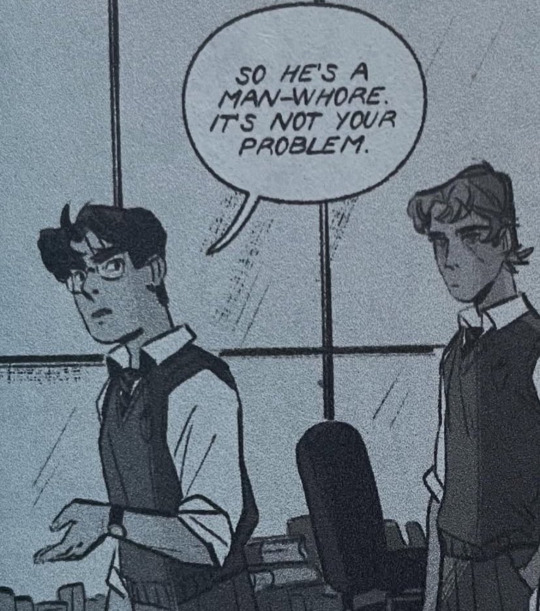
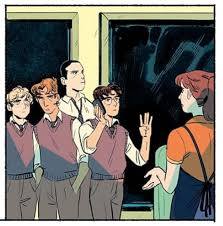
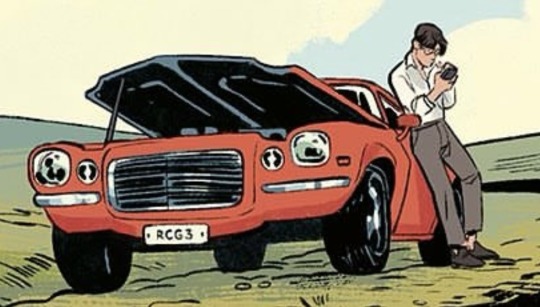
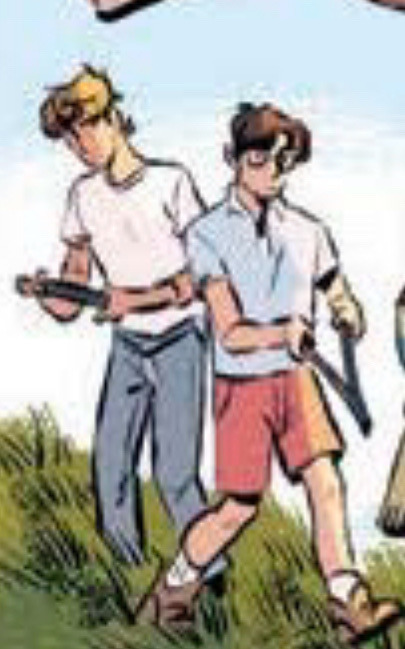
also here's a meme I made in tenth grade, for nostalgia sake:
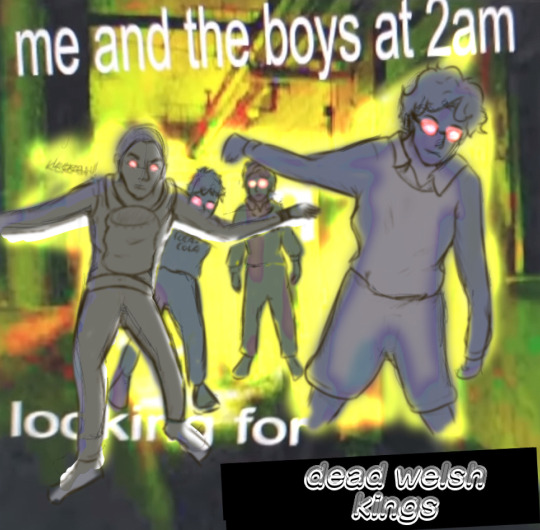
#this is so long im not even sorry#the raven cycle#gansey#blue sargent#ronan lynch#adam parrish#pynch#bluesey#henry cheng#noah czerny#my posts#its six am i spent... over twelve hours on this#tbh your fault asking an autistic to express why they love a book series (jk) ask me more things about the raven cycle it heals me
41 notes
·
View notes
Note
Hi! I wanted to ask your thoughts on something I’ve been thinking about—do you think Luz x Hunter might have worked better thematically than Lumity? I don’t like Lumity but I do like what it represents, especially for queer visibility in animation, honestly sometimes I feel like the pacing of their relationship was a bit rushed, especially considering how fast Amity’s shift from antagonist to love interest happened. With Luz and Hunter, there’s this slower, more emotionally grounded build-up. They both carry a lot of guilt tied to Belos and share this struggle with identity and feeling like outsiders. Their dynamic feels like it has more space for mutual healing and emotional intimacy, especially in episodes like “Hollow Mind” and “Thanks to Them,” where their connection grows through vulnerability rather than just romantic chemistry. Where Lumity is soft and sweet, Lunter feels heavier, more raw—like it reflects the show’s darker themes more directly. Honestly Lumity is horrible if I think about it critically. Amity was a massive bully and it made no sense for Luz to want to be with her. Especially since Luz herself is implied to be a victim of bullying herself. Luz went behind willows back and dated someone who bullied willow for years. Amity also had no reason to bully willow. It was of her own volition. Lumity makes amity into a boring character (all the blushing is really stupid) and it turns Luz into a horrible friend. To me, lunter makes way more sense thematically and they also would have been a great parallel to Caleb and Evelyn. Hunter ending up with a human also could have served to show how wrong belos views were. Thoughts?
Hey! This is such an interesting perspective, and I can definitely see where you're coming from. I think both Lumity and Lunter bring something meaningful to the story, albeit in very different ways. I have quite a few thoughts on this, so sorry in advance for the long post!
Lunter does have a more thematically intense and emotionally complex foundation, especially given their shared trauma and connection to Belos. Their dynamic allows for deeper exploration of guilt, redemption, and identity in a way that aligns with the show's darker themes. Episodes like "Hollow Mind" and "Thanks to Them" really highlight how their bond grows through vulnerability rather than romantic attraction, which is compelling.
Lumity, on the other hand, is a powerful representation of queer visibility in animation, and while the soft, wholesome nature of their bond offers something valuable, I’ve always felt that Amity’s shift from antagonist to love interest happened way too quickly and seemed somewhat unnatural. Her sudden change in personality felt rushed, which made it harder for me to fully connect with her arc. Instead of immediately pivoting into a romance, Amity needed more development—her character would have benefited from a slower, more thoughtful progression, allowing her growth to feel earned rather than primarily driven by her crush on Luz.
Additionally, I found it quite strange that Luz ended up dating one of her friend's former bullies—especially considering how long Amity had tormented Willow and as you said Luz herself is implied to have been a victim of bullying. It’s an aspect of the story that felt overlooked, and it raises questions about narrative consistency and how Luz’s choices impacted her friendships. Amity wasn’t forced into bullying Willow—she made that choice herself, which makes her redemption feel somewhat unaddressed. Although the show later retconned some of this, early on, her actions weren’t framed as something she was pressured into, but rather as something she did of her own volition. The rapid change in Amity’s characterization made her feel less nuanced to some viewers (myself included).
In fact, instead of Lumity, I started shipping Amity and Willow together, as well as Luz and Willow, since both of those dynamics felt more natural to me. Willow and Amity had a rich history that could have developed into a meaningful redemption arc, allowing Amity to properly atone for her past actions and rebuild trust organically rather than shifting into a romance with Luz so quickly. Meanwhile, Luz and Willow already had a deep and supportive friendship built on mutual understanding and respect. Their bond felt stable and emotionally fulfilling, which could have easily translated into a compelling romantic relationship without the baggage of past bullying or rushed character development. As for Lunter, I’ve always found their dynamic really cute. Their bond feels emotionally grounded, and the way they support each other through their shared struggles makes for a really compelling relationship.
Lunter could have been a more organic, slow-burn parallel to Caleb and Evelyn, reinforcing themes of found family and breaking cycles of abuse. Additionally, Hunter ending up with a human could have directly challenged Belos’ warped ideology, making for an interesting thematic contrast. Given Hunter’s struggle with identity and belonging, his arc could have been further enriched by a connection with Luz that emphasized acceptance and healing through understanding.
Ultimately, both pairings, Lumity and Lunter, bring value—it just depends on what resonates most with the viewer. You make a compelling case for why Lunter might have better complemented the overarching themes of the show. While Lumity undoubtedly provides necessary softness, Lunter could have offered a relationship with greater thematic depth—assuming the writing gave Hunter the time and space to grow into it. Given the sheer amount of trauma Hunter had to process, any potential romance between him and Luz would have needed to happen much later in the story, after he had the chance to fully confront his past and heal. Rushing into a relationship before he worked through his emotional baggage could have felt forced or even harmful to his character arc. Both ships have merit, but if Lunter had been the direction, the narrative would have needed adjustments to ensure the relationship developed meaningfully.
Additionally, the show's handling of romance and character development overall could have benefited from a bit more breathing room. Many relationships—platonic and romantic—progress quickly, and giving more time for natural development could have strengthened character arcs across the board. If Lunter had been explored, it would have been interesting to see how their dynamic evolved organically alongside their personal journeys rather than being forced into a more conventional romantic framework.
#the owl house#toh#the owl house critical#the owl house criticism#the owl house critical critical#toh critical#toh criticism#toh critical critical#lumity#amity blight#lunter#luz noceda
26 notes
·
View notes
Note
How do you write possessive characters? I think you mentioned a few times that Gojou would not be great at sharing. Could you expound on why you feel this way about his character and how you translate that into your writing? Do personal experiences in previous relationships matter or weigh in at all?
Sorry for so many questions! I feel like many people write jealous or possessive characters the same way, and it would help me to gain some perspective from someone whose work I enjoy reading. Thank you!
No worries, I usually enjoy being prompted to dissect my own writing!
So the answer to "how do you write possessive characters" is that some of them just...come out that way. It's a trope/theme I enjoy, of course, but I'm very picky about the execution when I'm reading, and when I'm writing, it's not always a conscious choice. I've mentioned this before, but most of my characterization analysis is a posthoc process. I just write what feels right, and then I sit back and evaluate what I've done. That was the case in the post where I talked about whether/how Gojou and Yuuji would be possessive, and this is more of the same.
First, as for whether my personal experiences play a role—nah. My preferred relationship mode is an open one where all parties involved are free to date or fuck whoever they want. I'm also aromantic as all hell, so the way I love my friends and lovers is the same; it's just a difference in intensity and approach. That doesn't lend itself to the kind of possessiveness that spices up fictional romance.
Now, onto Gojou! I'll be answering solely with goyuu in mind because that's (a) the only Gojou ship I care about and (b) the only ship other than satosugu that I consider plausible for Gojou. There would be differences in Gojou's behavior between goyuu and satosugu too, but my exploration of satosugu has been rather limited (references to a past relationship or outline notes on goyuuge development), so I'm not touching that angle.
When I say Gojou wouldn't share well, I specifically mean he'd be a horrendous metamour. As one third of a closed triad, for instance, I think he'd be quite fine. But sharing Yuuji with someone Gojou also doesn't love would bring out his cuntiest side because he is, fundamentally, sharing a role with them. He's not possessive of Yuuji's time or energy or even affection. He's canonically quite happy when Yuuji forms bonds with fellow sorcerers, and he seems to value Yuuji's approach to people and relationships.
What he would be possessive of is his role in Yuuji's life/heart. It's a tenuous thing, not because Yuuji's fickle or their bond is weak but because of the life they lead and the roles they play. There's a significant gap in age and experience, and for most of canon, Yuuji believes he's slated for execution, likely by Gojou's own hand. It's far from a secure basis for a relationship, and it only wouldn't stop either of them because they're both bugfuck insane in their own ways.
But they're still building a house of cards—at least it'd seem that way. Gojou wouldn't be insecure per se, but he'd be very aware of the fact that Yuuji could and should do better. On top of that, one of the defining moments in Gojou's life was Getou leaving—and leaving behind a hole nothing has filled, despite his earnest efforts. So having that hole filled (double entendre entirely intended) by a boy who has every reason to eventually leave—to find someone his own age, someone he doesn't believe would kill him, someone who hasn't made himself so untouchable that he's practically a god—would have him both keenly aware of the frailty of their relationship and no less invested for it.
That is what I base the flavor of Gojou's possessiveness on—consuming love, like I said in that other post. And it's not just that he wants to consume; he also wants to be consumed. That's not the kind of thing that leaves room for a third (or fourth or fifth) party, but if someone were to squeeze in—Yuuji has a big heart, and love's not a limited resource—Gojou would make their seat quite uncomfortable.
The specific way I write this varies. Often, it doesn't really need to be highlighted in the text because there are no external or internal factors warranting it. But off the top of my head, I've written
Gojou refusing to commit, having sex with Yuuji and others, and then acting like a right cunt when Yuuji also decides to get with someone else [fic]
Gojou preemptively snagging someone else Yuuji has an eye on to twist all three of them into a dysfunctional polycule [fic]
Gojou dubiously smoothly inserting himself into an ongoing sexual situation so that the end result comes out as a dysfunctional polycule (can you sense a pattern here?) [fic]
Gojou dragging his own teen self into the relationship with Yuuji to hasten the inevitable [fic]
My outlines have Gojou doing far worse too, and there are also non-possessive behaviors arising from the same psychological state—like Gojou believing Yuuji will leave but content to enjoy the time they do have together. I'd say that the most straightforward possessive Gojou I've written is the one in the kidnapping fic, and that's a specific cocktail of circumstances that bring out the worst of Gojou's impulses—even then, the possessive aspect only ramps up when a third party tries to make Yuuji leave Gojou. He also compensates (in a sense) later, though by that point, the whole relationship is...a radioactive mess.
This is already insanely long, so I'll shut up now. But I hope this more or less gives you the answers you wanted, anon!
25 notes
·
View notes
Text
Lot going on in this cutscene
Even the Pope recognizes that Nero is Vergil's kid! Seriously, he HAS to be either Dante or Vergil's, and I just cannot imagine that Dante would be a deadbeat dad. The game is screaming in our face that Nero has the blood of Sparda, so that really only leaves one option. You did not need the novelization nor DMC5 to "confirm" anything, it was plain as day right from this game.
It is somewhat unfortunate though that this is never really ACKNOWLEDGED by Nero? At any point? Dante knows, even the Pope knows, but Nero never really gets the full impact of this revelation. He wasn't particularly devout, but he still grew up in a culture that WORSHIPED SPARDA AS A SAVIOR for his entire life. The fact that his Holiness, the leader of the religion that defines his cultural upbringing, is telling him that he has the blood of Sparda SHOULD be a big deal? But it just isn't. Sure he has bigger fish to fry at the moment, and the Pope is obviously evil, but he still doesn't care at all and that just feels like a missed opportunity.
On the one hand I might figure that it speaks to Nero's character in the sense that he doesn't care about his heritage, he doesn't have any angst about his paternity or biological parents. He only cares about the family he has now with Kyrie. Buuuuuut DMC5 is going to refute that in a pretty major way. So really it's just another result of this game being half baked. As far as this game is concerned, Nero has absolutely no motivation goals or interests outside of being obsessed with Kyrie. DMC4 Nero is the ultimate malewife, basically.
Also, that's all she wrote for Credo. He's just done. We had one boss fight against him, and that's it. Every other boss fight in the game gets two, I'm not even kidding. Credo is probably the best boss fight in the game and we only get to fight him once. And man, his character his never even has a chance to get lift off. His death scene where he's willing to raise his sword against the Pope, the leader of the religion that he is extremely devout towards and has devoted his life as a holy enforcer for, all in the name of trying in vain to save his brother and sister is some good stuff! Because as per the defining theme of Devil May Cry as a series, family and love is the most powerful force in the universe and what makes humanity superior to demons. Credo surrendered his human body to the Order and became a demon soldier, but his heart always remained human and he was willing to throw everything away for the sake of Nero and Kyrie.
But then he's just tossed aside and discarded. And he has so very little, if anything, to build up his characterization up until this point. It's such a shame, I like Credo a lot but there's so little TO like about him. Nero and Kyrie never even mention him for the rest of the game! My precious Credo. You deserved so much better.
Nero flipping off Dante as he's vored into the status is really fun. Dante would never! Oh that Nero, he's such a rude and informal delinquent! But then he dissipates into the statues Predscape alongside Kyrie, and it feels very heavenly and romantic. Almost like a dream come true after a fashion. Nero and Kyrie, alone together, forever. But it's false, and the dream is ripped away from him, and he's lost in the nightmare without her. Johnny Yong Bosch is absolutely killing it with the voice acting. Kyrie saying "thank you" as she evaporates reminds me a lot of this moment from Final Fantasy Advent Children, where Aerith forgives Cloud.
youtube
"I never blamed you, not once. You came for me. That's all that matters."
Feels very Kyrie.
Once again I love Dante and Trish's chemistry, wish we got to see more of it. I think it's funny that Trish is taking up crowd control duty to save the civilians. Considering it's 100% her fault this is happening in the first place since she handed over the Sparda to them =P Maybe she's trying to make up for what was obviously a really stupid decision.
9 notes
·
View notes
Text
Fanfiction Recommendation (and a little reviews)
This time i will try to review(?) some sungbri fanfictions i’ve been binge reading since last year. I’ve been itching to do this. I actually crave more, especially the canon compliant ones, but i have to limit myself to keep my sanity. Also i need more fic about sungbriwoon family with parent sungbri and baby/son doun.
OK, I'll start now. Since english isn't my first language it will be messy. But the fanfictions I will review(?) is mostly in english bcus reading fanfictions in my own language makes me cringe >ᴗ< but i’ll also review them (in my own language), one or two that i really like. Also mostly they are from AO3, so yeah. To the writers that their fic i review(?) here, if you found this, please forgive me if this essay offends you or something, i didn't intend to.
Oh, to inform you guys (who?) I'm not a fan of the “switch” couple, I'm a “top!sungjin-bottom!brian/youngk” truther (bcus i refuse to believe someone with major babygirl behavior is a top, and king of testosterone, the epitome of masculinity, the ruler of men, the capital XY is a bottom). So, the fanfictions are limited to that. This will be a long list. Let's get started!
[redacted] by anonymous (idk who). 2021. Teen and Up. Chaptered. Completed. Alternative Universe. Youtuber. A story about youtube mukbanger sungbri one-sided rivalry. This is not the first sungbri fic i read, but this is the first i bookmarked. Maybe most of you have read this. I really love the story. I am actually not a fan of enemies/rivals to lovers but I had so much fun reading this, and keep re-reading. The story, the characterization, also the kangwondo dynamic, the best! The tiny ‘off’ from this fic (for me) is why would kangwondo text each other when they live under the same roof? I mean, yes their dynamic is fun to read, but I still don't get this kind of concept. But that doesn't make the fic bad. Overall is good. ദ്ദി ˉ͈̀꒳ˉ͈́ )✧
take my hand, don't ever let go by anonymous (idk who). 2021. Teen and Up. Chaptered. Completed. Alternative Universe. A story about fox hybrid youngk and restaurant owner/chef sungjin against the world or the governor and youngk adoptive parents, specifically. Wow, just this is a major spoiler for ones who haven't read this. But i believe most of you have read it. I love the world building also the characters dynamic. The slow burn from strangers to friends to lovers is aju nice! My favorite is jaepil dynamic, i really like detective parkjaehyung character here he's really cool and fun. Also, even not the major theme, i can still feel the thrill. I keep re-reading. Need to protect fox hybrids!
choice of convenience by sbanon. 2020. Teen and Up. Chaptered. Completed. Alternative Universe. This is the best fic (for me) that 'sums up' sungbri relationship irl. I always get the arranged marriage couple vibe from them, just add the drama and BOOM!! The writer didn't miss brian simping over sungjin agenda, it’s everywhere in the fic. Sungjin’s character is too tough and stoic, like a typical cold-hearted first male lead in k-drama, but it’s perfect for the plot and the drama. Because brian will shower and soften him with his unconditional love. The eternal sunshine is melting the tough guy character. Too bad we don't get doun as their adoptive son here. Overall it is perfect and the best. ദ്ദി(˵ •̀ ᴗ - ˵ ) ✧
Sbanon’s short fic collection. 2020-2021. Mature. Alternative Universe and Canon compliant. Here are my favorites: ✮ Urs. Friends with benefits to lovers. Angst with a happy ending. Love it! ✮ shadows and chicken wings. A very soft and domestic night call. Sungjin is away, brian is sleepy and missing his man so badly. ✮ fck me & feed me. Explicit. Wow HOT!! Just brian simping over sungjin agenda, but make it spicy. ( • ᴗ - ) ✧ ✮ it’s because i’m missing you. Just brian/youngk missing sungjin's voice or sungjin in general. ✮ star-crossed. Dramatic brian/youngk antagonize twitter zodiac sign post, kind of.
You and I and Eternity by pandaysal. 2021. Teen and Up. Oneshot. Alternative Universe. This is the one that is similar to gusari's iwaoi doujin "beginning to end" i talked about in my pre-pre-previous essay. The things about soulmate and childhood friends to lovers. I didnt mean it as plagiarism but the concept is so iwaoi. Idk how to word this right. If you ship both iwaoi and sungbri, you'll get what I mean. This fic is beautiful, angst with a happy ending.
you might need to hear this, i need to talk by orphan_account (aw, too bad). 2019. Teen and Up. Oneshot. Canon compliant. Depression and anxiety. Sungin in a storm and brian is there to calm the storm. I love how brian approaches Sungjin and handles the situation even though he’s just waking up. Reading this makes me sad, and hurts me too. But the writer gives it a soft scene for the ending. ദ്ദി( ╥ ᴗ ╥)
You know, I know by KlavierRPF (KlavierWrites). 2020. Teen and Up. Oneshot. Canon compliant. Sungbri relationship through 5+1 POV. From subtle pining for each other to lovers.
morning kiss by anonymous (idk who). 2021. Teen and Up. Oneshot. Alternative Universe. One fine morning in sungbri household. Featuring brian's parents and cat. A domestic, cute and soft fic.
everyone wants to find the most beautiful eyes, i just want to comb your hair. By smolcloud. 2023. General. Oneshot. Canon compliant. Stressed brian can’t finish a new song and can't sleep, goes to sungjin for comfort.
Beacon Hills series by anonymous (idk who). 2021-2022. Teen and Up, Mature, Explicit. Completed. Alternative Universe. Urban Fantasy. A story about werewolf sungjin and witch brian/youngk. This one reminds me of demon hunter iwaoi fic that was posted on ao3 too, idk what year it was posted but i believe this sungbri one posted first. I didn't mean it as plagiarism, they are totally two different fics but have similar vibe. Nevermind. Can be called friends to lovers to mates. Not really slow burn, not rushed too, the pace is just right.
GrumpyAsFuck’s fic collection. I really love their fics, I read almost all of them. The way they write, the detailed setting and character physical features (or flaws), the characterization, the push and pull, the suggestive theme, the tension, the punchline, all of them are the best quality ദ്ദി ˉ͈̀꒳ˉ͈́ )✧. I had a lot of fun everytime reading their stories. Mostly labeled as Mature, i’ll write it if it’s not. Here are some of their fics I really like: ✮ Dans le noir sans ton regard je saurai peut être mieux. A getting together canon compliant fic setting after sungbri D-Day. ✮ Young dumb and prone to public indecency. A story inspired by that famous clip of sungjin's amazing self-control for not grabbing brian/youngk exposed knee. I kept giggling while reading this one. ✮ Hug a bassist day. Just brian/youngk wants to be hugged by sungjin. A really cute fic. ✮ That grow (old) together type love. Domestic sungbri talking about their future after retirement. Sweet but a little angsty. ✮ Whisper it like a secret. A canon compliant fic inspired by brian/youngk shoulders flinched cutely. ✮ Smooth like (shea) butter. Just a lip treatment routine but make it a sungbri kiss fic. ✮ 230719. I call this one “Sungjin The Mosquito Hunter”. Brian/youngk can't sleep and Sungjin helps him. A funny fic with suggestive themes. ✮ 240117 – Busan Rizz. Brian/youngk flirting attempts backfire, kind of. ✮ 240306. I call this one “His Wardrobe”. Sungjin helps brian/youngk dress. This was definitely inspired by brian/youngk showing off he got free access to sungjin’s wardrobe. ✮ Was gonna love you (But I'm outnumbered). Explicit. Oneshot. Alternative Universe. Fantasy/Magic. Brian/youngk and his harem but all of them are sungjin. (≖⩊≖) ✮ Come sing by the fire with me. Teen and Up. Chaptered. Unfinished. Canon compliant. A secret relationship fic. Or they call it: parksungjjiniya missing episode. ✮ I wanna take you to a. Explicit. Oneshot. Canon compliant-ish Alternative Universe, kind of, idk how to word this right. Post military university student sungbri bonding (intimately). (≖⩊≖) ✮ Place locked away with tears. Oneshot. Alternative Universe. Not K-pop Idol. Halloween fic. Sungjin meets brian/youngk in a motel. Should've been a scary fic but the sadness is unbearable. ✮ No Such Thing As Bad Decisions In Kang Younghyun's Cook Book Of Great Decisions. Oneshot. Canon compliant. Sungbri having a pillowtalk(?). Definitely inspired by brian/youngk tmi about visiting sungjin in busan in the predebut era. ✮ Mr. Sandman. Explicit. Oneshot. Alternative Universe. Not K-pop Idol. A steaming hot fic with human sungjin and demon brian/youngk. ✮ Safe and Sound. A little conversation in the chairlift, I’ll call it the cut scene from ‘healing trip is an excuse 3’. Cant help but keep smiling while reading this. Super cute fluff. ✮ 250325 — nos racines s'entremêlent. Brian/youngk is anxious and Sungbri has a discussion about living together. Inspired by the news on Wonpil moving out. This story somehow calmed my ridiculous anxiety, ꉂ (´∀`)ʱªʱªʱª Also after hearing youngk’s story on ‘Maybe Tomorrow’ Live, I became to assume that this story was written by youngk himself. Nicely written, great story.
Drifting by centersoul. 2022. General. Oneshot. Canon compliant. A sleepy brian/youngk become super clingy to sungjin.
stuck on replay by anonymous (idk who). 2021. General. Oneshot. Alternative Universe. Kid fic. A story about uncle sungjin, kindergarten teacher brian/youngk and kid doun. A super adorable fic. (๑˃́ꇴ˂̀๑) I Need more sungbriwoon fic!!
Between The Cracks of A Concrete Wall by ssfsteaklates. 2019. Teen and Up. Oneshot. Alternative Universe. Not K-pop Idol. Sungjin gave brian/youngk all the privileges he wanted and deserved. Featuring jaepil the shipper.
what's in a name? by anonymous (idk who). 2021. General. Oneshot. Alternative Universe. Brian/youngk just wants to know that new barista's name.
see you on the flipside by anonymous (idk who). 2021. General. Oneshot. Canon compliant. A little story about sungjin calling brian/youngk the night before his enlistment.
and because you are a dream, i sleep a lot by smolcloud. 2023. General. Oneshot. Canon compliant. Sungjin becomes clingy bcus he's still sleepy and misses his brian/youngk. 'Day and Night' playing in the background.
Beyond These Four Walls series by lemonhopia. 2018-2020. Teen and Up, Mature. Unfinished. Alternative Universe. A cute story about office worker brian/youngk has a crush on new IT guy sungjin. Strangers to lovers. There's one spin-off about dopil getting together.
How To Love by wintercoda. 2021. General. Oneshot. Alternative Universe. Sound engineer. Grumpy(?) Sungjin is not very happy with this cheerful rookie brian, until one day he does.
Cross the Line by rorobynne. 2024. Oneshot. Canon compliant. Sungjin wants to kiss brian/youngk so badly.
those pleasures in the night by orphan_account (aw, too bad). 2020. Explicit. Oneshot. Omegaverse. Fox hybrid omega brian/youngk got in heat while on a concert tour.
Your name tattooed on my heart by anonymous (idk who). 2021. Explicit. Chaptered. Completed. Alternative Universe. Soulmate. Strangers to friends with benefits to enemies(?) to lovers for real. A story about tattoo artist sungjin that has trauma with an ex lover meets florist brian/youngk. A slow burn, eh not really, they straight(?) to sex tho. Even though labeled as explicit, I don't think it's that hot, just steamy, still safe. Full angst with spiciness, but happy ending. This is written beautifully. The way the writer executes this is brilliant. The conflict, the resolution, the drama. The pace is not that fast and not that slow, just right. It's so romantic sungjin's way to win brian's heart and trust back. Also how brian still putting his guard up even though he already accepts Sungjin's apology.
Brighter than Sunshine by wintercoda. 2023. Explicit. Chaptered. Completed. Alternative Universe. Sungjin brings brian/youngk to meet his parents. That fake relationship fic. Friends to lovers. I really like how the writer inserts the canon materials here. Fit perfectly! Also the domestic vibe! *chef kiss* My favorite part is when brian/youngk helping sungjin put on his shirt. Also when sungjin woke up to brian, hand across his chest and still with eyes closed, smiling to him. Very domestic and the tension too, ugh! Reading this again after 'witnessing' their relationship development irl is woah.. I wanna cry happy tears.
to the heart & back by seohngjin (cngkyns). 2020. General. Oneshot. Alternative Universe. Highschool. A slow burn enemies to friends then kinda fast burn to lovers. Ambitious brian antagonises sungjin just bcus he’s smarter and teachers favourite but too laid back for his liking. Lowkey, sungjin fell first but did nothing about it.
one, two, three (as easy as you + me) by anonymous (idk who). 2021. Teen and Up. Chaptered. Completed. Alternative Universe. Highschool. Sungjin fell first, brian/youngk oblivious. Or brian thinking he's a homewrecker. It's funny how brian character is the hot nerd(?) that has zero dating experience, not even a first kiss. But that's very cute of him. Also jaepil the third wheel. ( ദ്ദി ˙ᗜ˙ )
I Wanna, I Wanna, I Wanna Touch You by CrowsGift. 2022. Explicit. Oneshot. Canon compliant(?). Military era brian/youngk got punished by sungjin, in a hot way. (≖⩊≖)
Our Melodies and Melancholy by pskytales. 2024. Oneshot. Alternative Universe. A complicated story between singer sungjin and producer brian/youngk. Full angst but happy ending. Song fic, I guess. Listen to 'didn't know' while reading this.
A Gumiho's Guide to A Writer's Block series by anonymous (idk who). 2024. General. Unfinished. Alternative Universe. My roommate is a gumiho, literally. Not the drama, well idk what the drama is about.
Nobody Knows by anonymous (idk who). 2024. Explicit. Oneshot. Omegaverse. ‘Alpha’ Brian/youngk behind the closed door. P.s. he’s an omega. (≖⩊≖)
Possibly Till Sunrise by rorobynne. 2024. Mature. Oneshot. Brian/youngk exploring new spicy things and Sungjin can't get enough of him. I'm not sure, is this canon compliant or alternative universe, but super hot, love it! This should've been labeled as explicit rather than mature. I mean it, this is super hot!! (๑>•̀๑)
easy work for an easy A by honnou_archive (honnou). 2024. Teen and Up. Oneshot. Alternative Universe. Warning: age gap, but not really shown. Just take a wild guest. A funny fic but poor kimwonpil, boy must be traumatized, let's go to therapy together. ꉂ (´∀`)ʱªʱªʱª
Deisikseu’s alternative universe oneshot collection. Most of their stories are alternative universes. I mean how come one puts a pair in a lot of universes? That must be a multiverse of madness inside their head, and they aren't the common universe! Like mostly ‘magical’. Also I call them the master of angst sungbri, bcus how come this person loves to make sungbri suffer? But their writing skill is amazing, i can visualize every scene perfectly and the emotions are ugh, pained in my meow meow. All of their stories are labeled as mature, but lately(?) they make a 'corner' for explicit sungbri fics. Here are some of their fics I really like: ✮ 011693. Brian is lost and then ‘meets’ sungjin in an old phone booth. Kinda like the concept of 'your name' anime. Short angst, kinda eerie but magical. ✮ Where the Sunflower Grows. Yes, angst but happy ending! A beautiful story of sungjin and his beautiful sunflower. ✮ Beyond the Negatives. A really nice concept. A little angsty and magical. Kinda reminds me of something but I can't recall what it is. ✮ A Kiss of Celestial Ashes. Icarus sungjin’s endless love for sun brian/youngk. And of course he died, what did I expect? Damn hurt btw. (╥_╥) ✮ Letters in the Ruins. Soldier sungbri. Damn someone died! Of course it's a war story. ✮ Allergic to Love. I’m sorry for your break up, brian, but that brings you to sungjin. Finally! A sweet fic! ◝(ᵔᗜᵔ)◜ ✮ printf("Hello World!\n"); kind of creepy but nice concept. Should've been a halloween fic too. I really love the vibe and the setting in this one, wish I could be trapped there. ✮ Fading Strings. Damn hurt. Just hurt bruh, no comfort. ✮ Fading Grace. Zombie apocalypse. Of course someone died. I cry with you brian! (つ╥﹏╥)つ ✮ 7:20 am. A cute meet cute story. University student sungbri in a morning subway. ✮ Seafoam Lullabies. Siren brian/youngk and sailor sungjin. Someone died, not surprising. This one has the similar emotion and concept like the icarus one. The pain is unbearable. damn. ✮ Drafted in Red. Halloween fic. Cereal killer and writer, power couple!! That trope and the ship I've been obsessed with! *chef kiss* it’s actually soft for a thrill theme. ✮ Marlboro Reds. Explicit. Cigarettes are hot. Friends with benefits? ✮ BMW Sedan. Explicit. Sungbri in a steaming hot car. Porn with feelings. Friends with benefits to lovers. (๑>•̀๑) ✮ Valentine. Explicit. Brian/youngk is sungjin's valentine present. Shibari plus blindfold with some streak of melted chocolates, what a perfect and hot valentine present. (๑>•̀๑) ✮ Pricked by Golden Point. When cupid's arrow hits the cupid himself. Meet-cute. Super cute, super sweet. Like a rom-com movie. (˵ ¬ᴗ¬˵) ✮ Eclipse. When the sun and the moon kiss. That’s it! That’s the whole fic is about. ✮ Chocolatine. A soulmate au!! My favorite! Not really, the writer didn't mention it, just my assumption. A very sweet fic, just like the title. ✮ Ash and Silk. The prince and his knight eloping. A beautiful story, I might cry. No one dies, but it’s also not happy ever after. ✮ Bench Beneath the Gingko Tree. Teen and Up. Oneshot. This story is inspired by 'above the clouds'. Sungbri are an old married couple, they grow old and die together. A soulmate!! Okay, I think this is the first time in a while that a fanfiction makes me cry a lot. I've braced myself but still, literal tears rolled down my face. I recommend this bcus the story is really beautiful, it's not angst but it still damn hurts. Don't read it if you are sensitive with age like me. But if you do and if you can please leave a comment there, hehe.
fast times and fast nights by espressopeachtea. 2024. Teen and Up. Chaptered. Completed. Alternative Universe. A secret relationship between F1 driver sungjin and singer brian/youngk. The title suits the story, a fast burn from strangers to friends to lovers. I love how the writer inserted canon materials/events and adjusted them with the plot, I almost forgot this is not canon compliant. Also how the writer describes brian’s worry and emotion in general for sungjin, ugh i get it. I happened to read this after watching the ferrari movie, so it is easier to feel the emotions and the vibe. Great story! ദ്ദി(˵ •̀ ᴗ - ˵ )
beneath the shattered sky by sugarvixx. 2024. Teen and Up. Oneshot. Alternative Universe. Zombie apocalypse. The first part is funny, reminds me of zom100 anime. But of course the fun ends there. There is no hope. The writer already gave a trigger warning, so no use hoping for a happy ending, though there is a ‘soft and calm’ moment. That’s the ‘calm before the storm/in the eye of the storm’ scene. At least make them accidentally kiss once when they have the night talks! But, maybe the writer just wants to make sungbri suffer. Damn, I cry with you brian! (つ╥﹏╥)つ
worth it? by sugarvixx. 2024. General. Oneshot. Canon compliant. Doun the third wheel in action, his parents just need a little push to be together. Good job and thank you, doun (and writer)! ദ്ദി ˉ͈̀꒳ˉ͈́ )✧
feeling you by sugarvixx. 2024. General. Oneshot. Alternative Universe(?). Soulmate. A little story about sungbri, one night, finding out they are each other's soulmate.
Mr. YoungK by sugarvixx. 2024. General. Oneshot. Alternative Universe. Kid fic. A story about uncle sungjin and kindergarten teacher brian/youngk. One day, Sungjin picked up his niece from day care and fell for brian at first sight. Then the classic but cute misunderstanding. This one isn't tagged as sungbri fic, but it’s sungbri to me.
one little thing (a ring) by espressopeachtea. 2024. General. Oneshot. Wonpil accidentally pranks brian, kind of. Or brian wants THE ring from sungjin. I’m not sure, is this canon compliant or alternative universe.
A Puppy Business by clefaire. 2022. General. Oneshot. Canon compliant (i think). Not sungbri, but it’s really cute. One day, Doun turns into a puppy, and the desik hyungs take care of him. Or how to shower your puppy maknae with a lot of love by desik. A little sungbri moment there, you blink you missed it.
Let Me See Your Eyes by wintercoda. 2025. Explicit. Chaptered. Completed. Alternative Universe. College/University. One sided rivalry to friends to lovers. I’m not sure how to summarize this story, but it’s a great one. The writer uses some canon materials and adjusts them to the plot. It's a complicated story, there’s fluff and also angst. My emotions are up and down while reading this. Also I'm not sure if the ending is happy, but it’s not sad. Oh, right, this is tagged as explicit but i dont think the porn is that explicit. (≖⩊≖)
we could burn by moonsixes. 2025. Explicit. Oneshot. Canon compliant. A story when sungjin realized he always wanted brian all this time, a.k.a sungjin reciprocates brian’s feeling for him. Well, basically it’s sungjin overthinking until he does something about it, a.k.a sungjin letting his intrusive thoughts (feelings) win. It’s porn with feelings but super HOT!! The sexual tension is ugh, feels like I was there with them. freak. Idk how many times I re-read this. It’s written neatly, no rush, just right. Congratulations to sungbri, and thank you writer!
Love Shot by sungbricrumbs. 2020. Explicit. Oneshot. Canon compliant. Another great porn. ( ≖‿ ≖ )Heehee. At first I thought they would have a deep conversation about feelings(?), depression, and anxiety, then having a slow emotional make out session. But that won't suit the title. They have angry sex instead, I didn't expect the angry part actually, haha. But that makes this story even hotter. Burning hot!
Find You by sungbricrumbs. 2020. Teen and Up. Oneshot. Alternative Universe. Super angst. Sungjin is a soldier and Brian is a doctor. It takes place during the Korean war, so I guess Sungjin will die in this story. Brian/youngk sends sungjin off to war and waits for him to go home to him, Sungjin never makes it. The pace of this story is kinda slow, it makes me anxious and the sadness is unbearable. It’s heartbreaking. Damn hurts. I thought there would be an epilogue where they met again in a different life. It's cliche but would be nice. Overall, it’s a great story.
The Night They Met by sungbricrumbs. 2020. Explicit. Oneshot (?) Alternative Universe. Wah, I actually am not sure how to review this, but this is a great porn. It’s the classic meet-ugly(?), brian is drunk and throws up on sungjin, then sungjin takes him home and they have a drunk sex. Done. Very delicious. Also brian calls sungjin “oppa”. ꉂ (≧ヮ≦)
My Secretary Kang by sungbricrumbs. 2020. Explicit. Oneshot. Alternative Universe. So I assume this is the sequel of the story above, and the actual whole story is a twitter thread. Well i dont know the original tweets, i just stumbled on it while being desperate. But reading this as a standalone story is fine too, I guess. No need to read the whole story. Anyway it’s another great porn. (≖⩊≖) Very delicious.
let me go home by sapphireblu. 2025. Teen and Up. Oneshot. Alternative Universe. Just a soft slice of life story of a married couple sungbri, cuddling in their warm house. Super soft. Love it!
The Only Time by housecleaningmusic. 2025. Explicit. Oneshot. Canon compliant. When I read the summary, at first I was like, “finally someone writes about how pretty brian is when he cries.” I mean he has always been pretty, and I think he gets even prettier when he cries. But this was tagged as explicit and porn without plot, then i was like, “how come that can go together?” Still, I gave it a try to read, and damn it was A good porn. Definitely will re-read this as a bedtime story. Hahaha, freak! I think this is really funny.
Only by sugarvixx. 2025. Mature. Oneshot. Alternative Universe. This story is inspired by 'only'. Never expect a beautiful wedding song and 'blood and gore' tag, can go together. Maybe my imagination isn't that wild. Also didn't expect the 'corpse bride' reference, but that's a really nice and great idea. The story is not rushed or slow paced, the description is neat and nice, I can feel the mystery linger in the air (?). Ah, someone died but it's not sad. Don't worry, haha.
Thank you to all fanfiction writers, I know you write them for free so i hope you all have the best of life. ヾ( ˃ᴗ˂ )◞ • *✰ Also, it turns out I'm not good at reviewing things. I can’t help myself to write ‘this written beautifully’ in every title. Because IT IS!! I'm lacking in vocabulary and not really good at writing, honestly. I want to point out my favorite scene in every explicit fics. Every time the writer(s) writes: sungjin pins/holds brian’s both hands/wrists above his head just with one hand. That’s so woah. I’m so embarrassed writing this. (>/////< " ) That makes me wonder if he can really do that irl, i mean not in an explicit way, just for research purposes. (´∇`'')
(update: he can! well, not pinning them, but he can hold brian's both hands with just one hand! wow!!)
Next..
So, there are these 'freestyle' fics these people write and post on twitter. I call them freestyle bcus the writers don't care about formatting, just write out the ideas in their heads. Mostly the themes are slice of life, still some are canon compliant, some are alternative universes. Some are pretty short like just three long tweets, some are pretty long threads. I think this kind of writing is not popular yet in my place. I first saw these from ksungbri shipper accounts. At first I thought they write something like a 'news', like: "I saw this member yesterday at this place doing nothing." Bcus it's in Hangul, I'm too lazy to look up for the translation. But one day I gave it a try, and found out that this kind of writing is somewhat fun to read, I mean a little inconvenience since I have to look up for the translation. But some are worthy, some not, it depends on personal taste. So i bookmarked some, maybe you guys (who?) want to give them a try too. These stories don't have a title so the title is self-made for my own convenience, hehe. Also a reminder again, they are written in Korean Hangul, so you might need g.translate if you don't understand Korean like me, hehe. Here they are:
Sungjin and yonkkitty by 93persent. So here brian is literally a cat (Ke-Nyang/Ke-Kitty), and his human is sungjin. Just a cute slice of life story.
Sungbri cuddling by zzzzi_s2. Literally sungbri cuddling on bed, and sungjin kinda sentimental. They talk then sleep. This is canon compliant btw.
Sungbri weekday by 93persent. An alternative universe where sungbri is a couple but don't live together. One day brian/youngk visit sungjin’s place and suggest doing something spicy. Not a spicy fic btw, still tame, haha. This is kinda domestic.
Post-concert finale by myfavoritegy. A story after the last day of the encore concert, so it's canon compliant. This is written neatly, a beautiful story. They are so soft, vulnerable and domestic here.
Choding Sungbri by yummy_116. One day when sungbri got upset with each other, they wrote ‘things i hate about you’, then made up just like that. Very funny and childish. Here is the eng trans by kyugomi.
Next..
Rekomendasi fanfiction berbahasa inggris sudah, sekarang yang berbahasa indonesia. Sebenarnya, nggak banyak yang sudah kubaca. Bukan sombong atau gimana, memang sejak dulu entah apapun fandom dan kapalnya, aku lebih nyaman baca yang berbahasa inggris, apalagi yang labelnya dewasa. Sedikit cerita, pertama kali baca fanfiction dewasa berbahasa indonesia yang bahasanya eksplisit banget, aku trauma cukup lama. Mungkin karena pas baca itu aku belum cukup umur, jadi kayak ‘culture shock’ gitu. Sejak saat itu aku cuma baca fanfiction berbahasa inggris (terutama yang dewasa). Trus, nggak tau kenapa suka geli aja kalo baca yang berbahasa indonesia. Padahal (dulu pas masih nulis) aku cuma bisa nulis fanfiction berbahasa indonesia. Semoga para penulis fanfiction berbahasa indonesia tidak tersinggung dengan ‘pengakuanku’ ini. Maaf, ya… ( • ᴖ • 。)
OK, ini adalah beberapa fanfiction sungbri (atau generasi sekarang lebih suka menyebutnya AU) berbahasa indonesia yang pernah kubaca dan aku cukup suka dengan ceritanya.
you're coming to me by henryneedswater. 2024. Teen and Up. Oneshot. Alternative Universe. Bercerita tentang brian/youngk yang sedang menjalani masa KKN di desa kampung halaman sungjin. Setting-nya lokal alias tkp di indonesia, jadi budayanya juga indonesia. Ini adalah fanfiction sungbri berbahasa indonesia pertama yang aku baca, dan kayaknya yang pertama juga yang di-post di ao3. Jadi, karena waktu itu baru satu ini, aku coba iseng baca. Ternyata ceritanya nggak terlalu buruk meskipun kayaknya memang ditulis terburu-buru satu dudukan langsung jadi. Format penulisannya juga gak terlalu berantakan sekalipun alurnya bikin aku agak bingung. Tapi aku suka alur dan temanya. Good job! ( ദ്ദി ˙ᗜ˙ )
Perjodohan by liquidalveolar & breezyxwinter. 2020-2022. Chaptered. Completed. Alternative Universe. Cerita ini hampir sempurna buatku. Bercerita tentang brian/youngk, anak tunggal kaya raya yang manja, yang dipaksa dijodohkan untuk menikah dengan sungjin, anak tunggal dari keluarga menengah ke bawah yang kerjanya serabutan. Untuk yang ini aku nggak sengaja nemu pas searching keyword sungbri di twitter. Awalnya ragu-ragu mau baca, soalnya dari abstrak cerita kayak drama tipikal sinetron indonesia. Trus iseng aja pilih bab acak dan jadi penasaran. Ternyata tidak drama mendayu-dayu, cuma cerita kehidupan sehari-hari rumah tangga sungbri. Ditulis dengan rapi dan sederhana dan berbahasa indonesia yang baku (ada bahasa gaul juga sih), pakai aku-kamu bukan gue-elo, dan nggak belepotan dicampur percakapan bahasa inggris. Ya, sayangnya di dua bab terakhir nggak tau kenapa penulisnya pilih mencampur percakapan berbahasa inggris, ada juga di bab berapa tiba-tiba sungjin ngomong inggris. Itu yang kumaksud dengan hampir sempurna. Mengabaikan itu, sejujurnya tema dan jalan cerita cukup bagus, nggak terburu-buru juga nggak bertele-tele. Penggambaran karakter juga oke. Aku suka karakter ibunya sungjin. Trus aku juga suka penulis memilih membatasi munculnya nama/karakter baru, cuma fokus ke newlywed sungbri aja. Lucunya karakter baru yang diceritakan itu cuma 'varian' dari sungbri, kayak mantannya brian (sungjin 'dibalik') dan istrinya sungjin (brian versi perempuan). Aku suka banget pas di akhir dopil muncul sebagai anak mereka. (˶˃ ᵕ ˂˶)
Keluarga Bapak Sungjin by akubukanyaa. 2024. Chaptered. Ongoing. Alternative Universe? Canon Divergence? Parents!sungbri; sons!dopil. Warning!mpreg. Yang ini juga gak sengaja nemu, ada yang qrt trus muncul di timeline, iseng aja baca. Kayaknya si penulis juga iseng aja nulis. Nggak ada proofread, nulis langsung post. Lucu banget ceritanya, mungkin karena dicampur bahasa daerah, trus tkp di jawa tengah kayaknya. Sejauh ini ada enam cerita kalau nggak salah. Bercerita tentang keluarga bapak sungjin. Cara nulisnya itu sederhana tapi berantakan tapi temanya lucu. Penggambaran karakternya juga lucu. Suka banget sama bayi/balita wonpil disini. Jadi keinget video wonpil baru bisa jalan masih plonga-plongo itu. (๑˃́ꇴ˂̀๑) Nunggu kisah bayi/balita doun yang lempeng itu. Tiap kali baca ini, sambil cengar-cengir yang kupikirkan: kok bisa ya kepikiran nulis gitu. Aku suka penulis nyelipin bahan canon disini kayak kisah mancingnya doun trus brian gagal jadi idol tapi disuruh ngeband trus brian jadi dj radio, dan producer parksungjin! ♡(˃͈ ˂͈ ) Sejauh ini favoritku kisah ketemuan dan jadiannya sungbri. Aku tunggu ide kreatifmu yang super lucu itu, kak! ( • ᴗ - ) ✧
Disclosed Desires by bapaksungjinn. 2021. Mature. Oneshot. Alternative Universe. Bercerita tentang Sungjin seorang pengacara yang sedang menyelidiki misteri kakaknya yang menjadi korban pembunuhan, bertemu dengan Brian yang seorang orang tua tunggal yang memiliki usaha sewa alat selam dan tur kapal di sebuah pulau. Konsep dan cara penulisan ceritanya bagus, hanya saja alurnya terlalu cepat jadi kesannya agak berantakan. Tapi itu tidak terlalu berpengaruh ke ceritanya yang memang bagus. Aku suka pilihan kata dan bahasa yang dipakai penulis, kayak baca novel terjemahan. Pas baca ini rasanya kayak nonton drama, padahal aku bukan fans drama. Cukup menghibur. Oia, ada doun sebagai anaknya brian, yaay!!
Gaze by bapaksungjinn. 2021. General. Oneshot. Alternative Universe. Sungjin naksir Brian, mereka tidak saling kenal. Ini adalah cerita meet-cute, strangers to lovers dengan alur cepat. Ada adegan yang mirip mv lagu lama dari penyanyi wanita amerika yang terkenal itu. Ceritanya sederhana dan ditulis dengan bahasa yang bagus.
Chemistry by sungbricrumbs. 2020. Teen and Up. Oneshot. Alternative Universe. Bercerita tentang Sungjin sebagai tutor untuk Brian sebelum ujian. Gitu aja sih. Mereka cuma belajar bareng terus ciuman sedikit karena Brian banyak mau, terus sadar kalau mereka saling naksir. Oke, jadian deh! Cute. Ditulis dengan sangat rapi dan bahasa yang baik. Mungkin alurnya sedikit agak lambat, kesannya jadi agak membosankan. Tapi jujur keseluruhan ceritanya bagus kok. Brian babygirl sekali disini, Sungjin mana tahan. Aku nggak tahu apa rating yang kucantumkan untuk cerita ini sudah tepat. Soalnya mereka cuma ciuman aja sih, nggak lebih. Tapi deskripsinya agak detail. Jadi ya, gitu deh. (≖⩊≖)
Fanfiction sungbri berbahasa indonesia di atas kubaca karena iseng. Biasanya aku nggak bisa baca fanfiction dengan seting lokal, tapi cerita di atas bisa aku masukkan ke pengecualianku. Mungkin ada yang mau merekomendasikan padaku fanfiction sungbri berbahasa indonesia? Fanfiction ya, bukan au yang format screenshot-an chat wa gitu.
Terima kasih bagi kalian yang nyasar kesini dan membaca tulisan berantakan ini.. (*´▽`*)
Updated 25.06.08 Notes: Been a while. I've been on reader block mode for months. Every time I try to read one story, I close the tab after one or two first sentences bcus I lost the mood to read, idk why. So, here I am again after getting my reading mood back, updating this list. Some of them, I need to dive back to the past to find them, bcus they weren't posted on AO3. It's hard to find old fics if not there, I still count as new sungbri fic reader. I wish twitter writer post their fics on AO3 too. I mean it's easier for new reader to find old fics, and they don't need to censor the names. I mean why would they need to censor names in the first place I don't get it.
I'll update this again when I found a bunch of nice fics again.
#ao3 fanfic#sungbri#fanfiction recommendation#곰영#sungbri fanfictions#sungjin x brian#sungjin x young k
7 notes
·
View notes
Note
Hi there!
Ive recently stumbled across your works, and I just wanted to say that I enjoy your writing soso much!! Each time i read any of ur pieces, i feel ever so blessed that i can read them for freee,,, ??like wow!! I absolutely love your characterization of arthur, and any piece of banter you write never fails to make me laugh!
Your writing style is so addictive, ive honestly found myself missing it when I read anything else. Because of this, id like to ask if you have any book recs? hehee anything that inspired that brain and writing of yours seems like it would be a worthwile read!! From ur alltime favs, or recent favs, comfort books, or books that gave u personal epiphanies, pls feel free to not hold back !! (If its not too much trouble)
And once again, thank you soso much for all your lovely works!! 💗
I LOVE talking about books, so thank you so much for this ask. This is a very truncated list of some of my favourite authors and books because if I wanted to talk about all of them, that would be a post as long as one of my fics.
First up is Terry Pratchett, who I came to rather late; I just started reading Discworld in 2020, despite @clonemaster-general and @jinxedwood telling me years earlier I should read him, so they should feel free to be smug about the fact that I ignored their sound advice for a long time and then went, "Ok, where do I sign up for the cult" after reading approximately one (1) Pratchett novel.
Discworld is a fantasy satire series that's over 40 books long, but those 40+ books simply take place in the same world and do not have to be read in order, although I would recommend reading any subseries featuring the same characters in order (the City Watch books starting with 'Guards! Guards', the Witches starting with ''Wyrd Sisters' etc.) Pratchett did write some non-Discworld books, although the bulk of his very large body of work is that series. He was a very gifted writer who was able to present the stupidity and injustices of humanity in a way that made you laugh and feel that it's bearable to live alongside these things. No other author has made me laugh so much at dumb little puns or dick jokes and then suddenly slapped me with a banger of a line about human nature.
'The Once and Future King' by T.H. White. A retelling of Malory's 'Le Morte d'Arthur'. It's silly, it's touching, it asks why humans go to war. If you're tired of relentless grimdark, this book shows you that a novel can explore serious themes and ask serious questions of its readers while also being a bit silly and stupid, because like suffering, silliness and stupidity is an intrinsic part of the human experience.
'The Left Hand of Darkness' by Ursula Le Guin. I could really just say, "All of Ursula Le Guin's stuff" because I've read several novels, a ton of her short stories, plus most of her essay collections and I've loved them all, but I wanted to mention this one particularly because Le Guin was examining our ideas of gender and society in the fucking 60s and I'm tired of hearing right-wing nutjobs bang on about trans people like they're some alien species newly landed on our planet to kidnap our children. Also, what I love about Le Guin's sci-fi is that she was concerned primarily with the culture of alien societies, not laser guns, and her world building is incredibly deep in that regard. Her father was an anthropologist, and you can see how his studies shaped her writing.
'The Lymond Chronicles' by Dorothy Dunnett. I love me a good swashbuckler, and these are some good swashbucklers. There's also some really beautiful prose that really evokes the landscapes of 15th century Europe, and her action/battle scenes are some of the most gripping I've read. The caveat with this one is that I actually don't like the main character all that much; he's a real special guy who speaks all the languages, is good at all the things, is a master strategist at 20, and is hot to boot. But the story is told mostly through the POVs of other characters that get caught up in his exploits so you're not stuck in his insufferable perspective, and I found the books overall (there are six in the series) very hard to put down.
'The Count of Monte Cristo' by Alexandre Dumas. The OG swashbuckler, really. Shipwrecks! Duels! Poison! Revenge! People just don't do dramatic adventure novels like Dumas anymore.
'War and Peace' by Tolstoy. I can't not mention this; I've read it twice so far in English and once in Russian. Tolstoy was an amazing observer of human nature. Also, he clearly thought Napoleon was a little bitch and reading about him from the perspective of a Russian novelist is quite entertaining after reading about him from Victor Hugo's perspective.
'Les Miserables' by Victor Hugo. I also have to mention this one. Yes, there are very lengthy asides on the Parisian sewer system. In the middle of a chase scene. But tbh, Hugo was curious about everything and while maybe he talked about every single one of those things a bit too long, it still endears him to me. Also, he was known more as a poet than a novelist by contemporary readers, and even in translation I think the fact that he was a poet really comes through in the prose.
Also, really anything by Patricia McKillip if you want dreamy, poetic fantasy that feels like being dropped right into the middle of a fairytale where magic has no hard rules and is something a bit wild and dangerous and beautiful.
I also read a lot of non-fiction, so I'll just list a few of my faves: 'Survival in Auschwitz' by Primo Levi; 'The Gulag Archipelago' by Alexandre Solzhenitsyn; James Herriott's 'All Creatures Great and Small' series; 'Landmarks' by Robert Macfarlane (but really any of his nature writing; this one I liked particularly because it's about the power of language to evoke a sense of place and how our vocabulary for the natural world is slowly being subsumed by our increasingly technologically-driven world). 'The Demon-Haunted World' by Carl Sagan, which was written in the 90s but if anything is even more relevant today as we struggle with parsing the mythology of pseudoscience and the real-world harm it perpetuates.
And I read a fuck ton of poetry, so I'll just rattle off a list of some of my favourite poets: Wilfred Owen, Isaac Rosenberg, Siegfried Sassoon, Rupert Brooks, Edward Thomas (I also love his nature writing), Alexandre Blok, Pushkin, Ursula Le Guin (she's primarily known as a novelist, but she has some very good poetry as well), Mikhail Lermontov, Anna Akhmatova, Alexander Pope, Tennyson (particularly Idylls of the King), Seamus Heaney, and Yeats.
Anyway, this is a small sampler of books I've read and loved.
28 notes
·
View notes
Note
hihi!!! :D fanfic author to another fanfic author hehe
i’ve read all of your drv3 fanfics and they are very intriguing, in canon characterizations, plot driven stories that make me very happy to read and look forward for more! (abso love trans shuichi hc too aaa)
i was wondering if you make pre-planned outlines for your fanfics or do you go straight into writing and planning it as you go? i’m struggling in finding a fitting method myself to write my fanfics because i often jump straight into writing, but that got me stumped in my writings at times. asking for advice because i really love your compelling writing style but you don’t have to answer if you don’t want to :D!
First of all... Hi! :D Thank you so much!! I do my best <3 💕
Second... Oh boy, I sure do have a process xD (this might be a long post but I like yapping and overexplaining so bear with me qwq)
if you don't want to read it all though, the shorter answer is: Kind of? I don't fully plan it out, but I don't always totally wing it. I take notes and I build off of important scenes, and then I jump in and hope for the best lol
When I first decide I want to write something with intent to post it, I create a document soley for *notes*. Theres a few things I note before and when writing.
1. I replay/rewatch the canon game and take notes on everything I possibly can. For example! I'm replaying DRV3 chapter 5 (cus i, unfortunately, had an idea q_q). I note down what I see as important or what really stands out to me :) Hell, sometimes I'll even "transcript" down canon dialogue! For example, this is what some of my notes look like (ss1 is taken from my drv3 c5 notes, ss2 is taken from my blue eyes notes):
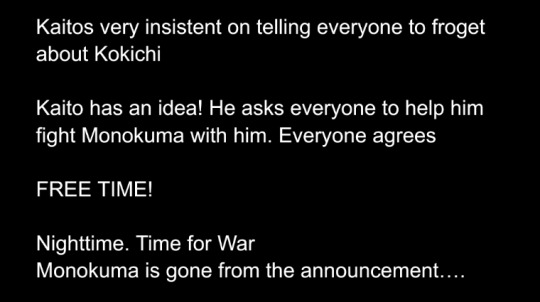
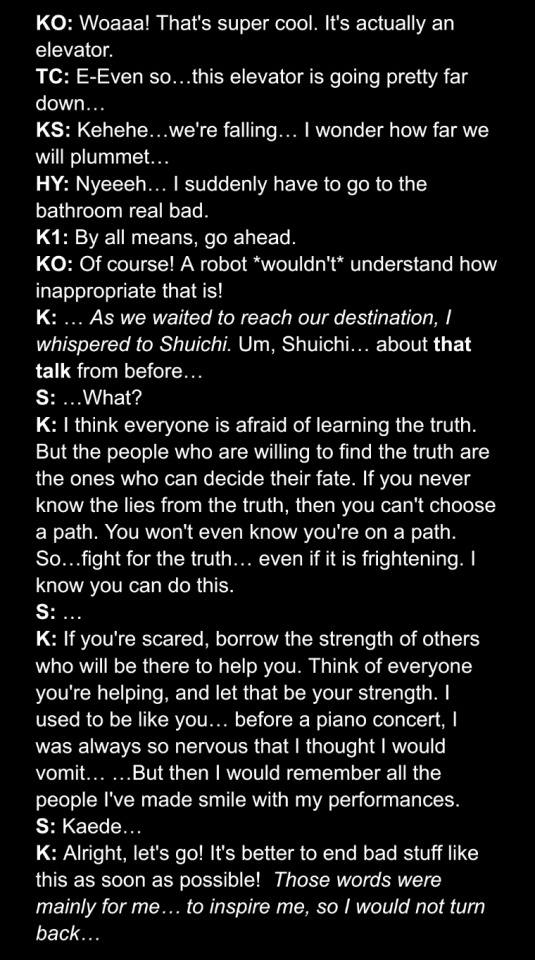
2. Little things matter. When starting my notes, I often write down the date I started and the basic synopsis of what the story will be about. I try to think of a name for the fic later because my #1 weakness is naming things >.> ... But also! Writing down the important details of your story is suuuper helpful, because you don't want to lose track of stuff like that!! It can prevent accidental retconning, unnecessary repetitions, and stuff like that 'cause i ran out of examples... Oh well. Here's a screenshot of the start of my notes for Motive 5 (. ❛ ᴗ ❛.)
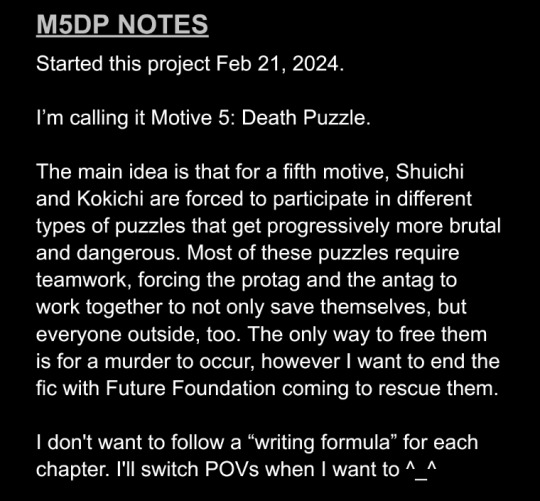
3. Believe it or not... i don't always plan ahead. I write a lot of my fics with one or more certain scenes in mind, and then I blink and there's suddenly a 7k word document in front of me and Oh Fuck I accidentally made a whole fanfic on that one idea. It happens more than you'd think. Using Motive 5 as an example again, there were a few scenes I had in mind when I was first writing! I don't remember what order they came to me in, but a few significant ones I fell asleep to was Shuichi losing his hand, Hajime and Maki facing off, Nagito and Shuichi meeting after the Coffin Puzzle, and the aftermath of Shuichi's "punishment" (PS. did you know he was originally gonna be tortured with sound? then i wanted to hang him from the ceiling periodically, but i gave that up for the "detention" theme.) this one is getting long but when it comes to planning, I always build off of important scenes in my mind. "How can I make this happen?" "What do I do to make this/these character(s) react like this?" or, my favorite... "What can I do to totally fuck up these sad gay losers?"
You mentioned you get stumped writing sometimes, and THAT'S OKAY. i do too. Chapter 8 of Fever Frost was a whole ordeal because I realized "wait. Kokichi would never confess his feelings first in this situation??!!!" While planning ahead may certainly help save you from some of those moments, they won't stop it entirely. It does feel really refreshing when you manage to skirt your way around the issue, so really what can you do ¯\_(ツ)_/¯
So yeah, I do kind of plan ahead. I plan MOST of the plot (I didn't even know I was gonna kill someone in Fever Frost at first >.>) and then as you write, stuff tends to tie together and build from there. In my experience, 70% of writing is just "shit kinda happens" xD
This is just how I do it, and it's okay if it doesn't work for you. I'm just the kind of person that will replay an entire game to write a fanfiction (─.─||)I hope this could help a little, though! Good luck on your fics! :3💕
#smookies asks#i promised i would never replay the fifth chapter#and yet here i am now#replaying the fifth chapter#life comes at you fast#trans shuichi hc is based btw glad we can agree!
8 notes
·
View notes
Text
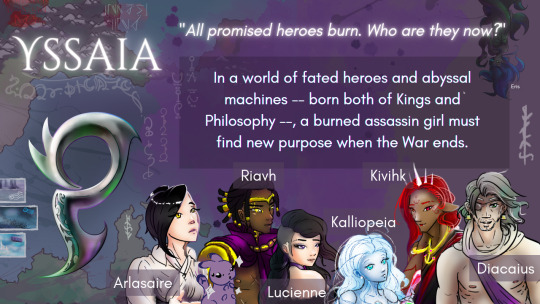
Yssaia
⚜️NaNoWriMo WIP 2024⚜️
"All promised heroes burn. Who are they now?"
In a world of fated heroes and abyssal machines -- born both of Kings and Philosophy --, a burned assassin girl must find new purpose when the War ends.
Untitled Yssaia Game will someday become a narrative-focused, hand-drawn adventure. Navigate an assassin through her delicate, brutal world after the War annexed her homeland. Delve deep into political dealings, your past trauma, and the Abyss beneath the world.
...but for today, it's still just a very large Reedsy document, some art, and a handful of songs.
🏆THE CHALLENGE'S OBJECTIVE🏆
This NaNoWriMo, I just want to write every day. I don't have the time or breakneck pace to do the traditional 50k words. I also want to log my progress cuz every year, I don't journal as much as I should and every year, I regret that. My memory and sense of time is better when I journal. So, we gotta get back into it, once again.
In terms of my current progress, there are about 245k words in this wip -- though it has multiple story arcs. We'll see what the market says to do with it, as we get closer to video game form... I have done a round or two of editing maybe? It doesn't feel like it but I also spent since February of last year editing. I thought it was going to take a month. It did not. 😭😭😭 Now, I am back to drafting -- thank God. Right now, I'm drafting a story arc about my protagonist struggling with her new relationships, falling into old toxic patterns, and discovering the enemies of her enemies -- the Gods.
🧑🧑🧒CHARACTERS🧑🧑🧒
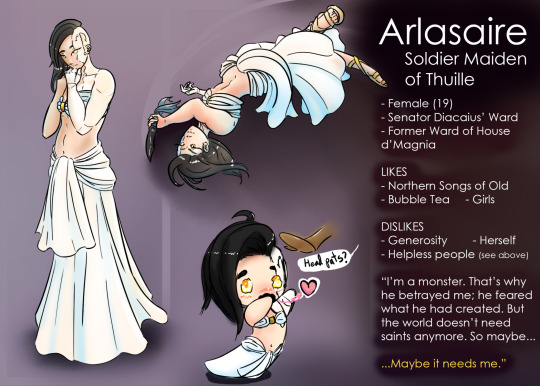
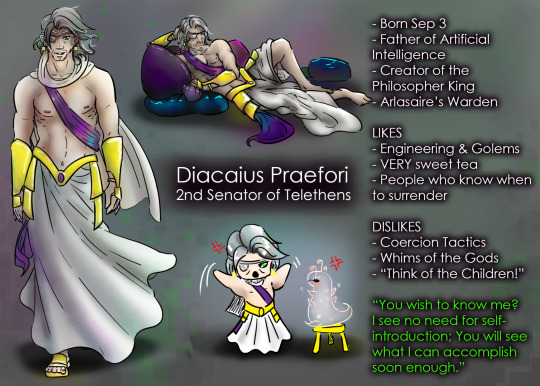
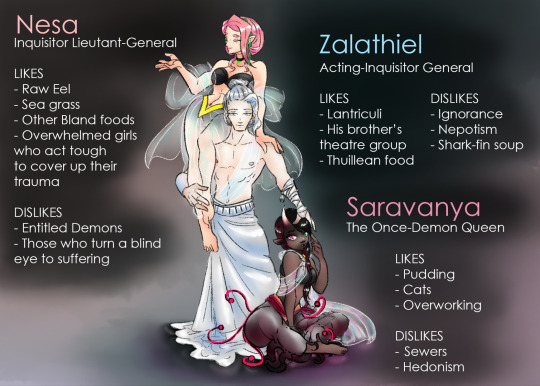
Yssaia is multi-POV and has a lot of perspectives with unequal time. If I were a perfect creator, I'd give them increasingly equal time throughout the work -- and end the story with characters taking turns between paragraphs in the battle against the Gods. This is all part of a giant experiment in which I fight against Great Man History. We'll see if it works lol cuz it sounds insane but that's legitimately why I'm showing so many different perspectives.
Naturally, there are many more characters and POVs than the ones pictured here.
The characters all have a lot of anime influence -- not just in their visual language, but also in their characterization -- but they also take a lot of influence from those Literary Fiction short stories I had to read in college. They're all written in a retrospective first person and verb all their nouns and have some sort of linguistic quirk for their POV. I mean like "One POV has 2nd person" kind of quirk. I love playing with form. I don't WANT you to feel like my work is super easy to read -- I want you to THINK about it.
🌩THE GODS OF YSSAIA🌬
The currently fighting Gods of Yssaia are basically representing Connection, Conquest, and Despair. Something something thematic arguments for a modern age but ALSO "use the power of friendship to kill God." The Gods all have what I like to call "humansonas" (think like the Christian Jesus) whom are represented below:
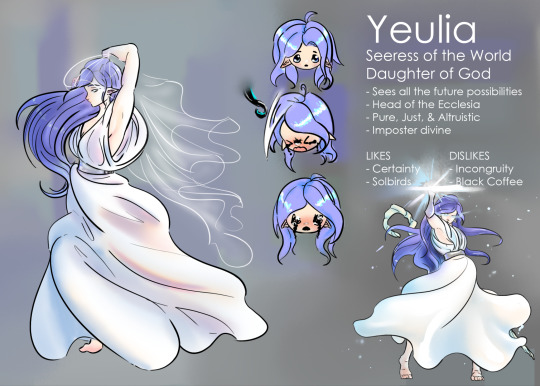
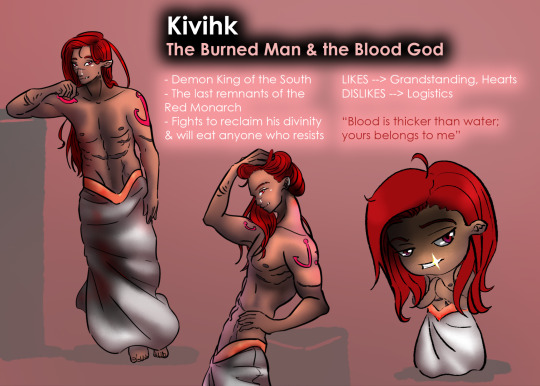
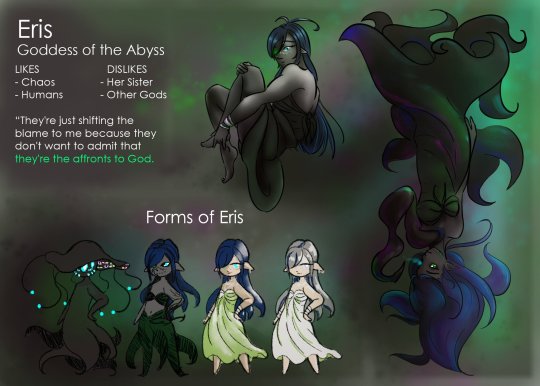
🗺THE WORLDBUILDING🗺
I have been working on Yssaia since 2018, so the worldbuilding has only gotten deeper and deeper. While the shape of the world and the general cultures have remained the same, they've all gotten a lot more nuance and geographical fidelity and also, conlangs: I have conlangs for every culture in the language and I'm very proud because language and power is one of the themes I like to play with. Yes, that's an IB thing. If you're interested in worldbuilding or conlanging, I actually run a worldbuilding YouTube channel so come check it out.
But if I had to summarize it, my world building is "Fantasy 1880s-1910s with a melancholic but whimsical feel and cute eldritch horrors. All the cultures are a mixture between Asian and Western cultures" (like Chinese Vikings, Japanese French-Mafias, Communist Grecoromans, and Slavic Indians, etc.) I have endeavored to ensure there is something about each culture that is "my favorite" -- ama about my worldbuilding 🥺💜
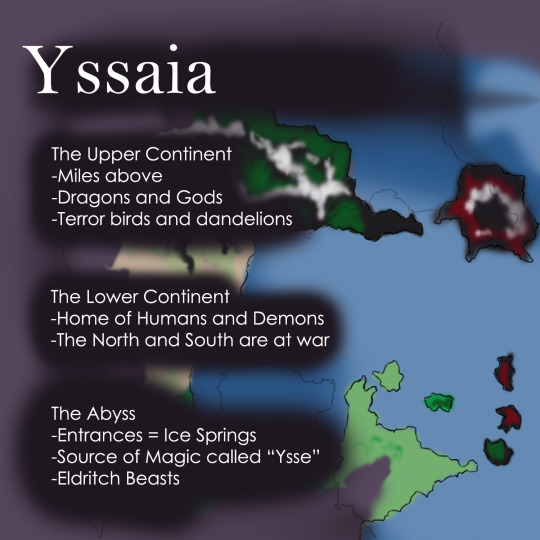
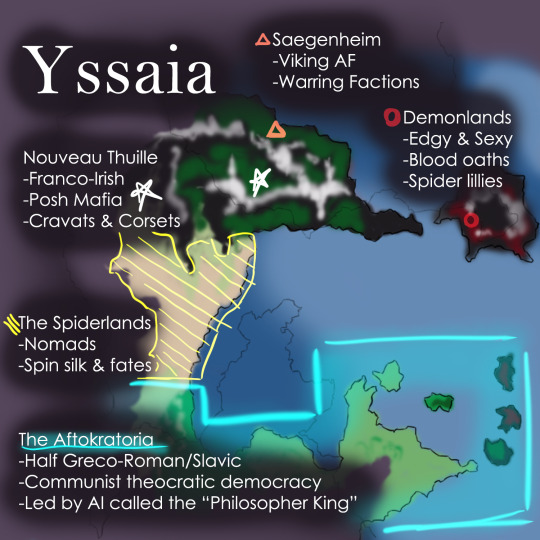
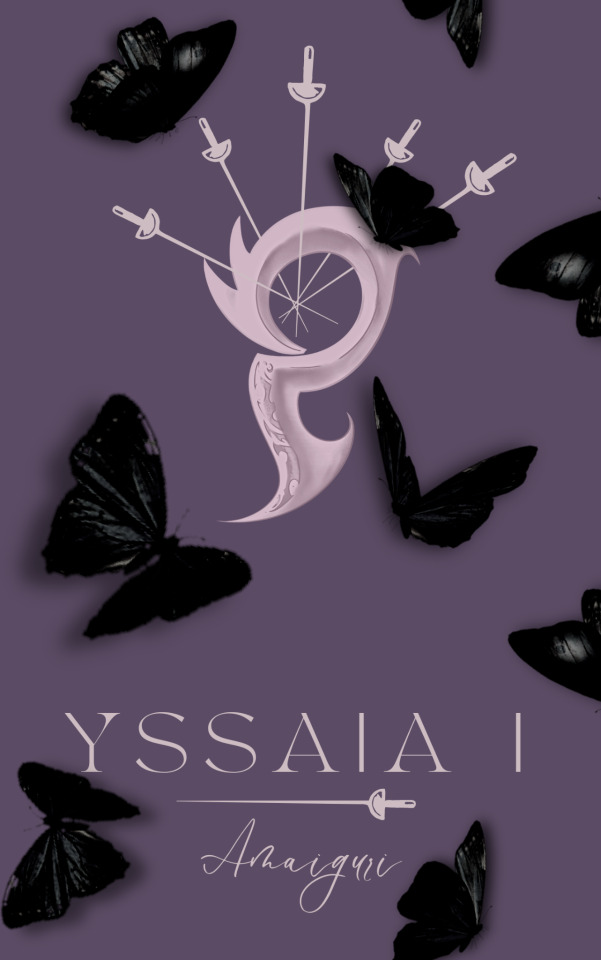
Follow for Part 2, when I talk about the game design someday!
#nano 2024#nanowrimo 2024#nanowrimo#writing#writeblr#gamedev#fantasy writing#am writing#amwriting#amaiguri#yssaia
5 notes
·
View notes
Note
also "darkfic au that got out of control" is such a funny description to me 😭 im curious as to why you think so personally i thought it was pretty balanced in heavy and lighthearted moments and considering the themes like the effects of imperialism i dont see why it wouldnt be handled as such. havent watched in a while tho idk
oooohh okay so this’ll be a fun thing to answer because i’ve been desperate to ramble about ‘03 plot points to anyone who will listen all week. so for me, honestly, the darkfic vibes come more from how deeply it dredges into the dark aspects, if that makes any sense?? most of what’s “dark” in ‘03 already exists and is explored in brotherhood, like the imperialism aspects as you mentioned, as well as grief and trauma and everything else that comes prepackaged with fma’s core story. but brotherhood handled these in a very shonen way (which is to be expected, of course). the darkness pushes the characters forward, makes them fight on. even when they’re at the brink, they’re called back by a loved one, or by their own convictions, and it retains an overall positive feel.
meanwhile in ‘03, i get the specific vibe that the writers looked at the story they already had, and asked themselves “how can this be worse??”
(inserting a read more because i’m about to go on a MASSIVE tangent, sorry.)
and so, here are some of the specific darker aspects that stood out the most to me:
the build-up to nina is given far more screentime and its place in the timeline is totally different. not only are the elrics so much younger here, but they’re also essentially a part of the tucker family for the better part of several months iirc. they also witness the direct aftermath of her death at the hands of scar (which is also implied to be FAR more gruesome here), whereas in brotherhood they find out from riza the morning after it happens.
there’s the whole barry ordeal which afaik doesn’t serve much purpose other than it, well, being kinda neat to see pre-armor barry. and i could totally be misremembering here and/or missing something important but the whole episode just stands out to me as “hey, i don’t think that ed’s had enough trauma yet. let’s sprinkle in some attempted murder.”
everything with the laboratory, holy shit. tucker’s reappearance, the attempts at recreating nina, the prisoners, everything with kimblee, the way ed almost activates the array, ALL OF IT is insane in this version.
al’s doubts about his memories and his origins is a longer arc and leads to more conflict with ed in this version.
mustang and winry’s parents. mustang’s suicide attempt. everything with mustang that’s not comic relief (which there’s still plenty of).
as stated in the tags of my first ‘03 post, the utilization of rose’s character is a really intense departure (while interesting!!) that completely took me aback.
the entirely different lore surrounding the homunculi is both incredibly fascinating and a lot to take in, and it leads to them being far more mentally vulnerable and tormented characters than they are in brotherhood. the contrast alone between the development greed gets in brotherhood (using him as an example since he effectively has the most character growth out of the homunculi there) and the development that lust, wrath, and sloth get in ‘03 stands out the most to me.
sloth in general. it’s a wildly fascinating take and, in addition to REALLY hammering in the themes surrounding their mother’s transmutation, also stands to provide even more trauma for the elrics.
and on that subject, the adults are far less present for the boys in this version. that’s not to say that they’re like “parents” or anything in brotherhood, but they’re a lot more openly concerned for them in a personal, affectionate way in that show. whereas here, especially in the early segments, i’m pretty sure that ed could have died in a ditch somewhere and they wouldn’t have noticed for at least a week.
scar’s characterization is more vulnerable here and both his death and the events leading up to it are insane.
and that’s not even getting into everything with dante, which deserves its own post.
with all that said, i’m also not even done with this show yet. i still have four eps left!!
but, all rambling aside, that’s what specifically gave me the darkfic sort of vibe. not to demean the show or reduce it to fanfic terms, or anything; it’s still very interesting and competent writing. but it just gives me so much whiplash when compared to brotherhood’s overarching feelings of hope and the ability to fight back and change the future for the better. it feels soul-nourishing to me, in a way. meanwhile, ‘03 is like a cavalcade of trauma, all provoked by the question “you know what’d be really fucked up??”
#fma#SORRY FOR THE WALL OF TEXT i had a lot to say#and the fact that this darkness can coexist with the goofy shit a la the psiren episode is really something#i do think that ‘03 at peak silly is sillier than brotherhood at times#but the peak darkness in ‘03 is also so much darker than brotherhood’s peak darkness#SHUTTING UP NOW#ask
5 notes
·
View notes
Text
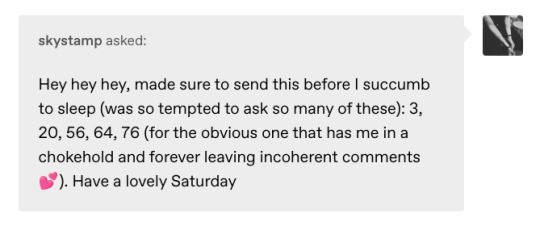
Okay, here's the rest!
20. Have you noticed any patterns in your fics? Words/expressions that appear a lot, themes, common settings, etc?
I'm not going to tell you the words I use too much because once I point them out you won't stop seeing it lol. But I do have recurring things. I write a lot of people getting drunk. I don't drink so that's kind of funny, but it's a useful way to write people at their silliest or their most truthful or to loosen up a tough nut, make a control freak lose control, etc. I write a lot of secret relationships. I write a lot of us against the world stuff, and I do love it when that relationship is a bit too close to be "healthy." I like making people who don't want to, or are scared to, fall in love fall in love. I write a lot of pining. I love pining while fucking especially. I'm sure there are others.
56. What’s something about your writing that you pride yourself on?
Characterization always. I'll never sacrifice character for a plot point. And I think my characters are distinct. Like the characters I write for one fandom aren't the same ones I write in every fandom. Dialogue that sounds like how people talk. Porn is my art etc.
64. Something you love to see in smut.
Specificity. I don't mean specific sex acts, or some specific description of them. But smut that's specific to the characters in that story. I feel like a lot of people write generic sex scenes. The same generic porn dialogue. The same generic tab a in slot b stuff. No matter what fandom or characters, it's the same scenes. I don't mean writers need to come up with more creative, weirder, kinkier sex acts. (I'm pro-kink but that's not what I mean.) No a simple blowjob, a handjob, ass fucking, whatever. Even if you're talking about the basics those things shouldn't be generic. All sex shares some basic building blocks, but the sex you have with different partners is different! If the smut could be cut/pasted into any fic, that's boring. That's why people talk about skipping over smut scenes. It's because it's the same scenes we've all read before. It's because it's like you've stopped telling your story to "INSERT SMUT HERE" instead of making the smut part of the story.
What's actually hot is thinking about how these characters, these very individual and specific ones, would get each other off. So what I love to see in smut are little things, little intimacies that feel specific to these two people. I like it when the way they're talking to each other and touching each other and turning each other on feels specific to them, and also specific to the situation. Like in Sleight of Hand the first blowjob Eddie gives Steve is a very different vibe from the first blowjob Steve gives Eddie, and it's because those are different characters in different situations. Just... Specificity.
76. Did you have any ideas that didn’t make the final cut of Sleight of Hand?
Yeah, some of the ones I can remember... There was a thing where Eddie finds the nail bat. There was going to be a thing where Eddie and Jonathan talk, and Eddie asks him if he's ever worried Nancy will go back to Steve. There was going to be a thing where Steve and Eddie fuck on ecstasy. I took a thing with everybody at the diner out of chapter 18. IDK lots of things. Most of them never got fully written anyway, but I had like four or five versions of the nail bat scene. In the end I needed Eddie trusting Steve to put on the cuffs, and no matter how I tried to write it, it just introduced too much doubt. I spent a few days writing all these versions trying to get them back to status quo by the end so I could get on with the rest of the fic. But I was trying to force it so it wouldn't affect the rest of the plot, and that always plays false.
Since I'm already all up in my cut folder, here's a DVD deleted scene. It was going to be either when they're going to Dustin's or when they're going to the lake. Either way it doesn't work.
---
“Um, Steve?” Eddie says. “Why is there a bat with fucking nails through it in your trunk?” Ah. Steve had sort of forgotten that was back there. Eddie hefts it in his hand, and swings it experimentally. “This is like post-apocalyptic, man. It’s like Snake Plissken shit.” He looks at the nail end more closely. “Does this have blood on it?”
Not human blood. Steve takes the bat out of Eddie’s hand and puts it back in his trunk. Closes it like if he can’t see it, Eddie will forget about the whole thing. He grasps desperately for a believable lie. It’s for emergencies? It’s for car trouble? Self-defense? “It was for Halloween,” is what he comes up with.
“Halloween was forever ago,” Eddie says skeptically. “Why’s it still in your trunk?”
“I forgot it was there.”
Eddie keeps looking at him, sharp-eyed. Seeing right through him. “What costume was it?”
Jesus. If this is going to be a whole interrogation, Steve’s not going to hold up under questioning. “That guy,” he tries. “Snake Pimpkin?”
Eddie snorts. “You know I can tell when you’re lying, right? You’re fucking bad at it.”
“Can we go?” Steve says. “You can keep bugging me in the car if you want.”
“I’m not bugging you,” Eddie says, but he gets into the passenger’s seat. Thank God. Steve quickly follows and starts pulling out so Eddie can’t change his mind. “It’s a little weird that you have an apocalypse bat,” Eddie says. ”But it’s very, very weird you’re lying about it.”
“You lie about stuff.”
“Not stuff like- Weapons.” He frowns. “Is it- Billy? Or those guys?” Steve tightens his grip on the steering wheel. Eddie looks at him disbelieving. “You’re really not gonna tell me?”
What if Steve just said it. Just- Monsters are real. They killed Barb. They killed that guy who worked at the Radio Shack. Maybe Eddie would believe him. He’s into all that fantasy stuff. He knows what a demogorgon is. At least the version in his D&D books. But- Monsters in books is different. Steve doesn’t know if he could tell it well enough to make Eddie believe him when it sounds fucking crazy. Demodogs and government conspiracies and possessed little kids and underground tunnels and things coming out of the fucking walls… Hell, he barely believed it himself the first time, and he actually saw it.
Steve looks at him, agonized.
”Wow,” he says. “You’re really not. I’m-” Eddie pulls some of his hair in front of his mouth, looking at Steve like he’s never seen him before. Studying him. “I think- I need a minute to adjust here.”
“What do mean- Adjust.”
“I mean this is bigger, and it’s fucking weirder, than the kind of secret I thought you were capable of keeping. So if I was wrong about that-” He shrugs. “Who fucking knows.”
“So you can’t trust me if I don’t tell you,” Steve says. “But if I do, you won’t fucking believe me.”
“You don’t know I wont believe you.”
“I wouldn’t,” Steve mutters. He looks over at Eddie. “I don’t- Ask you about your mom or your dad or-” Or where you learned to suck cock or why you don’t want me to tell you how I feel about you.
Something hard ticks over Eddie’s face. “Yeah?” he says. “And I don’t ask you where your bruises come from, or why you have nightmares so bad you came looking for me in the first place, or why you’re not okay even though you keep fucking saying you’re okay-”
“I get it,” Steve breaks in.
“I’d say we’re pretty even on the mind your business front.” Eddie kicks at the footwell, his arms crossed defensively. Steve keeps his eyes on the road. He doesn’t- He can’t think of anything to say. To make it better. “We all have our secrets,” Eddie finally says, relenting. “You can have yours. But this feels different.”
“I want to tell you,” Steve says. “But it sounds crazy. And I can’t- Prove it.” And the gate is closed. “And the reason I have that,” Steve says. “It’s gone now.”
Eddie cocks his head. “If it’s gone, why is the bat still in your trunk?”
Steve swallows, jaw clenching. Why does he still have the bat? He knows why. He just- Tries not to think about that. He dips his head in acknowledgement. “Because, I don’t believe it’s really gone. For good.”
Eddie rubs at his face with his hands, looking up at Steve a little wild in the eyes. “None of this is inspiring faith, man.”
“If the reason I have that bat ever becomes a- Thing you need to know about. If it does ever come back, I’ll tell you everything, I promise,” Steve says. “Can you trust me?”
Eddie looks at him for a long moment, looks at him like he’s trying to see all the way inside him. And then gives a one shouldered shrug. “Fine. Keep your secrets."
6 notes
·
View notes
Note
i'm curious.. what are some movies that you think are good adaptations of their books (like dracula, hill house, etc)? or movies that aren't the best adaptations but you would still recommend
HI ANON I LOVE THIS QUESTION!! Film adaptation of books is a topic that interests me deeply because I think there’s so many factors that go into whether or not an adaptation is successful, including things that are very subjective and situational… I’m definitely of the mind that an adaptation needn’t be super exact or faithful to be good, in fact some of my favorite adaptations take a lot of liberties with the source material to tell a better story via it’s given medium (film or tv), and intentionally use things specific to film like cinematography/sound/visual/design to translate the book onto screen
An example of an adaptation I loved, and that I think is an interesting case study of the subject at hand is crash (1996). I once uploaded a video of cronenberg’s press conference with the original author, JG Ballard, who personally loves the movie says during it that he think it’s best movie adaptation of a book ever lol Despite all the differences!!! Cronenberg dropped whole plot lines from the book (such as the Elizabeth Taylor one), went very minimalist on the script to focus on capturing the experience of the book.
The book itself is of course crazy non-stop bash of violent and erotic prose about car crashes, so I think it’s effective that Cronenberg spends so much time obsessively lingering over the sex and violence. It’s an approach slower and more clinical than the book BUT. I remember him saying that the point of the movie is that by the end, your sense of eroticism and it’s scope should have slowly shifted to accommodate the world of the movie. It’s the same effect the book has!! Which is why it works as an adaptation for me
You mention hill house, it’s really unfortunate that I don’t think it’s ever gotten a proper adaptation that I like though I’ve seen all of them :( I’ve said before on here that I really disliked Mike Flanagan’s approach, again, not because I dislike changes to a story! But bc I think the changes he made flattened the characters and relationships. I also think his style of directing isn’t capable of translating the gothic world of Shirley Jackson stories…he has too incessant of a need to overexplain his themes and none of the strange whimsy. I’ve actually said I think stoker 2013 is waaaaay more successful at emulating Shirley Jackson, and setting the tone for character like India/Merricat because of the directing. The strange and purposeful cinematography does so much to characterize India, in the same way that Jackson’s prose introduces us to Merricat’s rituals and magic…
SORRY THIS GOT REALLY LONG. In general I am very forgiving of adaptations if I personally think they are beautiful or fun (dracula 1992 and Roger Corman adapting Edgar Allen Poe, respectively). There are also some times where I actually enjoy the movie better than the book! (the talented mr. ripely or re-animator 1985). Like Stuart Gordon and his lovecraft adaptations, sometimes it really becomes a thing of its own, almost entirely separate from the books and I can still respect that too! Films can build up their own lore and canon, and i think it can be fun :)
6 notes
·
View notes
Text


So, I've been sick the past couple days. This led to me watching the Code Geass compilation movies. I don't know, the brain works in mysterious ways.
God, Code Geass.
This was another one of those anime things that was just omnipresent for a while in the late '00s. I think it's held up a lot better than its one-time sort-of-rival Death Note, but that's a very low bar to clear (I do not like Death Note at all). Code Geass, or at least the refracted form of it presented here in these recap movies (and going off of my own memories of the original show), is a series I like but don't really....respect. I don't personally get that feeling super often, usually it's the other way around.
It's hard to pin exactly why that is. It's not the campiness---I love that stuff---and it's not the characters, most of whom I genuinely really like. I think it's down to the narrative and what comes out of that narrative. Code Geass' themes and *especially* its political ideas are very....haphazard? They're definitely there; the idea that power corrupts, the question of what it means to deceive, political ideas about war, genocide, colonialism, and so on, but they feel surprisingly incoherent for a show whose central premise builds off the fact that it's taking place in an occupied country. There's a very strong FEELING of there being a big struggle between ideas, but I think that feeling is mostly illusory. The show's characters end up being defined more by their personal connections. Even the proposed duality of Lelouch as the pragmatist and Suzaku as the idealist seems to exist mostly to be taken apart over the course of the story.
On the other hand, maybe that's a good thing? Maybe---intentionally or not---that's what we should be taking out of this, that big ideals tend to falter in the face of the much more immediate pull of the people we love and hate? I don't know, that feels like giving the series a pass in a way I'm not sure I'm totally onboard with.
I'm spending a lot of time criticizing it here, but I do actually like this series. I think for its faults it works really well on a moment to moment level and it hits just an absolute ton of my personal buttons; big mecha fights, rapidfire mind games, and a generally theatrical sense of characterization.
The movies also change a few things from the original series. Mostly these are for the better; Shirley survives the entirety of the recap films, for example, and the entirety of Mao's character and plotline are---thank fuck---ommitted. Some of them I don't really get; Nina is less driven by being a Crazy Lesbian TM which is a good thing for sure, but also the motivation that makes up for that (mostly just being a hysterical racist) clunks off the narrative in a really uncomfortable way, since the series doesn't really address it. Ech.
Also the pacing of the three films both individually and in aggregate is absolutely horrible, like, people complain about pacing in stuff *all the time* but this is some of the worst I've seen in a modern anime production. An advantage the original series had was that, for all its weird detours about, say, Kallen's mom being a fantasy-drug addict or whatever, you got to spend more actual *time* with the characters, so they felt a bit more fully realized. This is definitely a case where the recap films do expect you to be familiar with the original despite making some of those changes. Which is itself fair enough in of itself I suppose, they are called RECAP films after all, but it did make me cognizant of the fact that like, it mostly sort of smears over the reasons people got super attached to characters like (again) Kallen, or Jeremiah. They both get plenty of screentime in these movies and they're absolutely great in what time they do get (and this is the case for a number of other characters as well), but the sheer difference in how these things are structured vis a vis the original show does reveal a few shortcomings of the format. IDK, I feel like I'm writing in circles at this point and again am coming off as more critical than I want to be.
Let me talk about something I think really shines in the movies. You know who's great in these films? This fuckin guy.
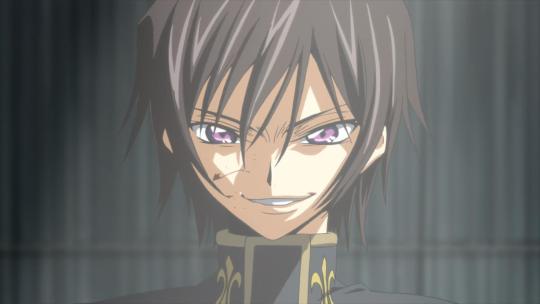
Lelouch is, to me, a hysterical fucking character. Bundle of contradictions, impossibly cool loser, gay as hell but always ends up with a woman because Reasons. When I was a youngish teen and watched Code Geass for the first time I had zero idea who Char Aznable was, but, like, this is pretty uncontroversial, right? Lelouch Lamperouge is the millennial Char. He is our forefathers' accomplishments handed down to us as farce. I absolutely hate him, and I hate that I still think he's as super fucking cool as I did when I first watched this story at age 14. My favorite scene in all three movies combined was when he got stabbed in the heart and died, and many of the other scenes I really liked involved him doing something extra. I'm going to bet his death doesn't stick, given that the sequel film to this trilogy (which is an original story!) is called Lelouch of the Re;surrection. What is that semicolon doing there. I'm the last person on earth who should be talking about semicolon placement but come on.
Some other thoughts:
When I was in high school I got into an argument with a friend over whether Kallen's knightmare frame (god, the mecha are fucking called knightmare frames), the Guren, was the coolest giant robot of all time. I don't stand by that assertion itself, but I do think its big hand weapon the Wave Surger is one of the sickest fucking things in this or any mecha series
For being in large part about how colonialism sucks, this series sure isn't in a hurry to visit any part of the world that's actually affected strongly by it IRL, huh? I get that there are Watsonian reasons for this but c'mon.
Kallen and Lelouch's romance in this is even less convincing than it was in the original series which is honestly impressive
Opposite of the above, I find Lelouch / C.C. a little more believable this go-around. Not sure how much of that is it being meaningfully different here vs. me just changing as a person as I've gotten older vs. who knows what else
the entirety of the World of C stuff is still so fucking bizarre to me. it's been years and I still cannot figure out for the life of me why that was how they chose to resolve that whole thing. It feels deliberate, though, because it's not really altered in any major way here and Gorou Taniguchi did something similar in Back Arrow (it kind of fit better there because that show is just weird as hell to begin with, but still, the similarities are striking).
the battles in this are really grandiose and cool and carried the movies for me when the plot did not
I love Kallen so much you guys, you don't even understand
the above bullet point again but about C.C. this time
I miss the gratuitous Pizza Hut advertisements so much. I don't know why. The fact that I do feels like a sign that something is deeply wrong with me.
They cut The Table Scene. Because of Woke, I assume.
god this got long for me just basically being like "I like this but it has a lot of problems." Whatever, no one reads these LOL
3 notes
·
View notes
Note
asks for you: something you are looking forward to but haven't told anyone about? last song listened to? last thing you bookmarked? newest graphic tshirt you got yourself? last person you called just to chat? last mattfoggy prompt you gave yourself but haven't done anything with, yet? what do you want to see happen most in DD:BA?
something you are looking forward to but haven't told anyone about?
My friends are coming over this weekend for my husband's birthday party. My husband is a gamer TM and one of his favorite games is "Factorio" which is a game about being stranded on an alien planet and having to build a bunch of stuff to get your spaceship off the ground so you can go home. (I keep joking that it's big kid pikmin.) There's a lot of machinery and factories and conveyor belts, so we factored that into the party. In addition to thematically appropriate board games, we got this oval shaped lazy susan thing that is sort of like a manual conveyor belt you spin with your hand, and it looks a bit like a factory belt too. We're going to set out ingredients so people can make their own custom snacks (miso soup, salad, onigiri, mini sushi cakes, etc) and finish it off with s'mores over this little s'more maker that coincidentally looks like the forge in the game. People know the theme of the party in general terms, but I don't think any of them have played this game themselves, and nobody knows about the "build your own" aspect of the menu, so I'm excited to see their reactions.
last song listened to?
Piplup Step (Piplup Cheer You Up)
last thing you bookmarked?
Hahaha, I'm so bad at bookmarks. There's a shortbread recipe I have open that I need to come back to.
newest graphic tshirt you got yourself?
In December I got a shirt from Vapor95 that is black with these teal jellyfish on it. But like, in a vapor/chillwave kind of way, not a "I'm into aquariums" way. XD Not that there's anything wrong with aquariums lol.
last person you called just to chat?
Returned a call to my friend Tiffany and caught up about our holidays and upcoming events.
last mattfoggy prompt you gave yourself but haven't done anything with, yet?
Okay, this is SO dumb but I found a jokey meme post on tumblr last night that was about being ten and waiting for the day wings sprung out from your spine and THEN everyone would SEE. And I just imagined Foggy and Matt in college and Foggy relating all these "one day people will see how special I am" childhood fantasies he has with Matt (who is trying SO HARD for people not to see how special he is). Anyways, we'll see if anything comes of it.
what do you want to see happen most in DD:BA?
You know, I don't spend that much time hemming and hawwing over it, I'm very "whatever will be will be" and believe that no matter what happens in the new show, it can't take away my good memories of the original one. I mean, broadly, I would want to see all of the characters treated with respect not just in their individual characterization, but their importance to the series overall. IYKYK. I know we won't hear about it since they're not in place anymore, but damn would I have loved to see Matt and his thoughts on the Sokovia accords (since they were a thing in the NMCU! They played a big part in Jeessica Jones!!!) I'd also like to know more about how Fisk went from being in superjail to a viable candidate for mayor, like, I assume it had something to do with the instability of the blip but STILL? I can understand him being out of prison (who was going to run prisons during the blip) but the man was going to do LIFE and somehow he was out and about during the blip with the same level of influence over the police as before? HOW. Just, give me a flashback, give me SOMETHING. If we're going to see him try to be mayor I need to know what his "I'm totally reformed" pitch is gonna be.
2 notes
·
View notes